30 Questions You’d Need to Ace to Pass 6th Grade English

Sure, you know how to speak English. Maybe you even write it pretty well. But even if you pride yourself on having a solid handle on the language, it’s a good bet that some of the precise terminology and grammar rules from your nascent days of school have developed a layer of rust over the years. The result? Your average sixth grader could school you in a head-to-head.
That’s right. Adults, despite spending hour after consecutive hour reading and writing, tend to overlook some basic rules about the English language—stuff the 10-year-old whiz down the street could rattle off like it’s as simple as the alphabet. Don’t believe us? Here are 30 questions an A-student sixth grader would be able to get right, no problem—in ascending order of difficulty. See how you stack up. And if you’re looking to further burnish your understanding of the English language, don’t miss these 47 Cool Foreign Words That Will Make You Sound Crazy Sophisticated.
Question: Correct the capitalization.
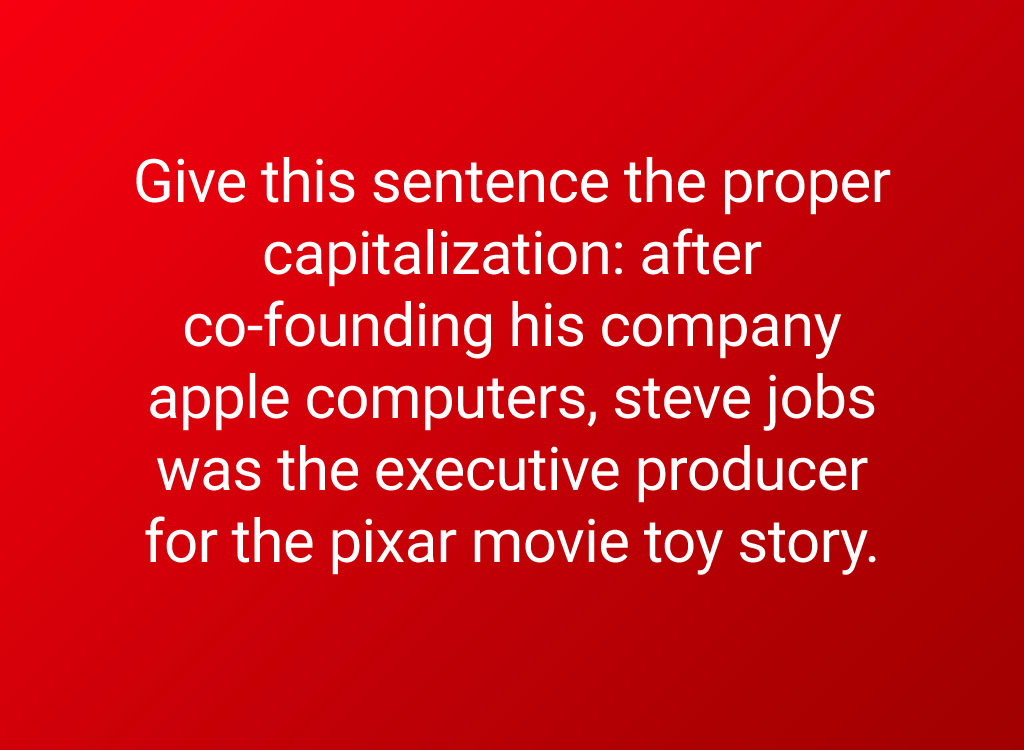
Capital letters are used to start sentences and identify proper nouns.
Answer: Eight words need it.
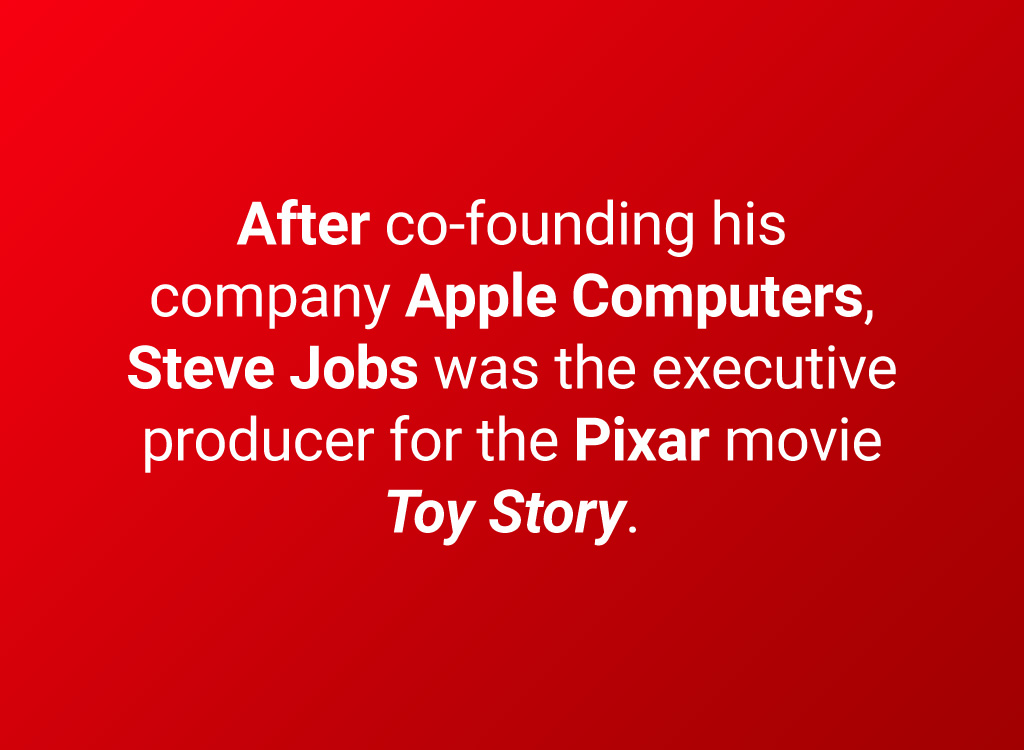
A proper noun refers to a unique thing, in this case a company (or two), a name, and a movie title. Be careful with job titles, which are only capitalized when used as a person’s title. “Executive Producer Steve Jobs” uses capital letters, but “he’s the executive producer” does not. The start of a sentence, too, is always capitalized, unless the sentence starts with a proper noun that begins in a lowercase letter, like “iPhone.”
So the answer here would be: After co-founding his company Apple Computers, Steve Jobs was the executive producer for the Pixar movie Toy Story. (Oh, and you’ll also have to set film titles in italicized font.) And for more ways to challenge your brain, Try These Brain Teasers to Find Out if You’re Smarter Than an Astronaut.
Question: Define the word “anticipate.”
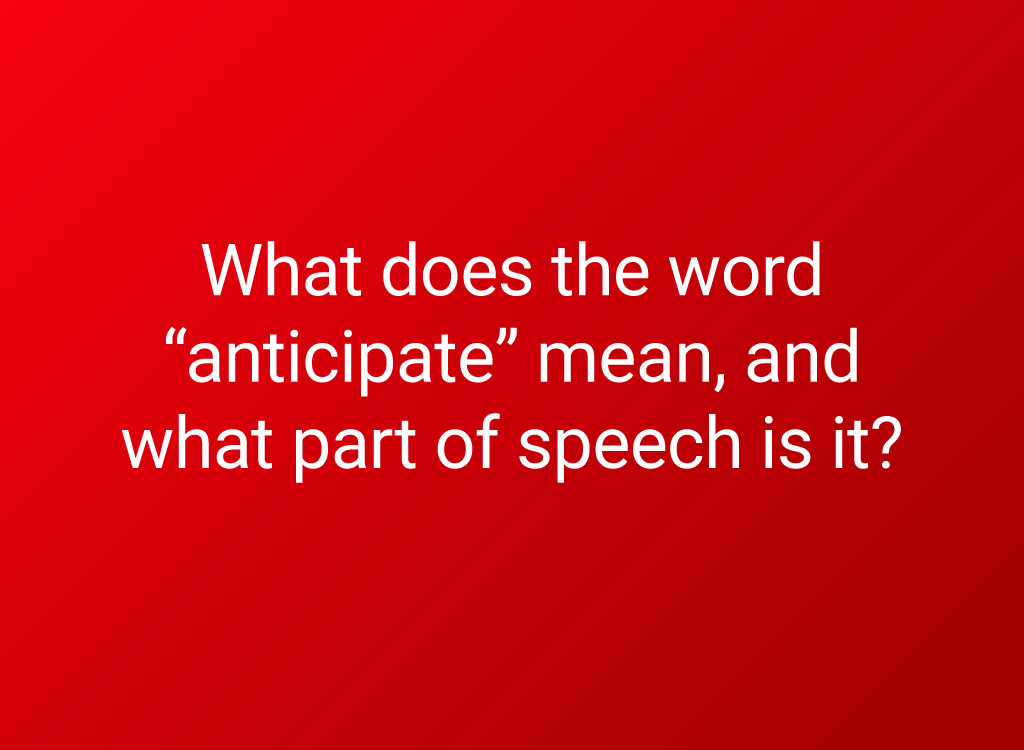
By sixth grade, you’ll need to learn a lot of common vocabulary words.
Answer: “To know of something before it happens” or “to expect.”
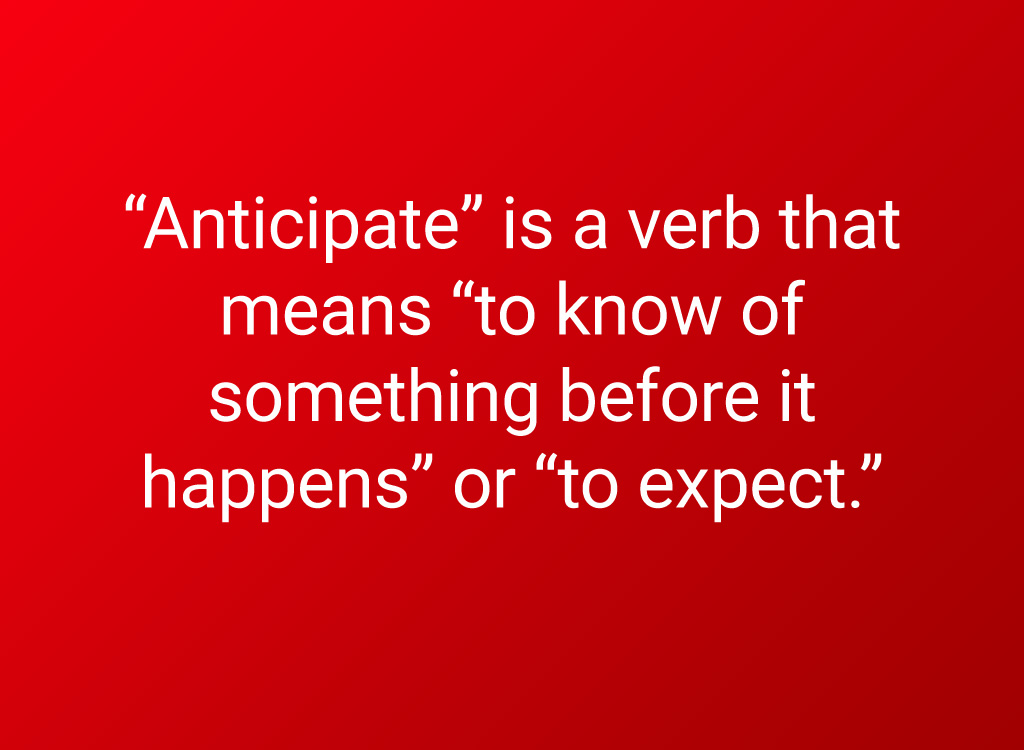
Here it is in a sentence: As she was getting ready for vacation, Ivy anticipated having a lot of fun at Disney World. And yes, if we weren’t clear, “anticipate” is a verb!
Question: Use context clues to figure out what the underlined word means.
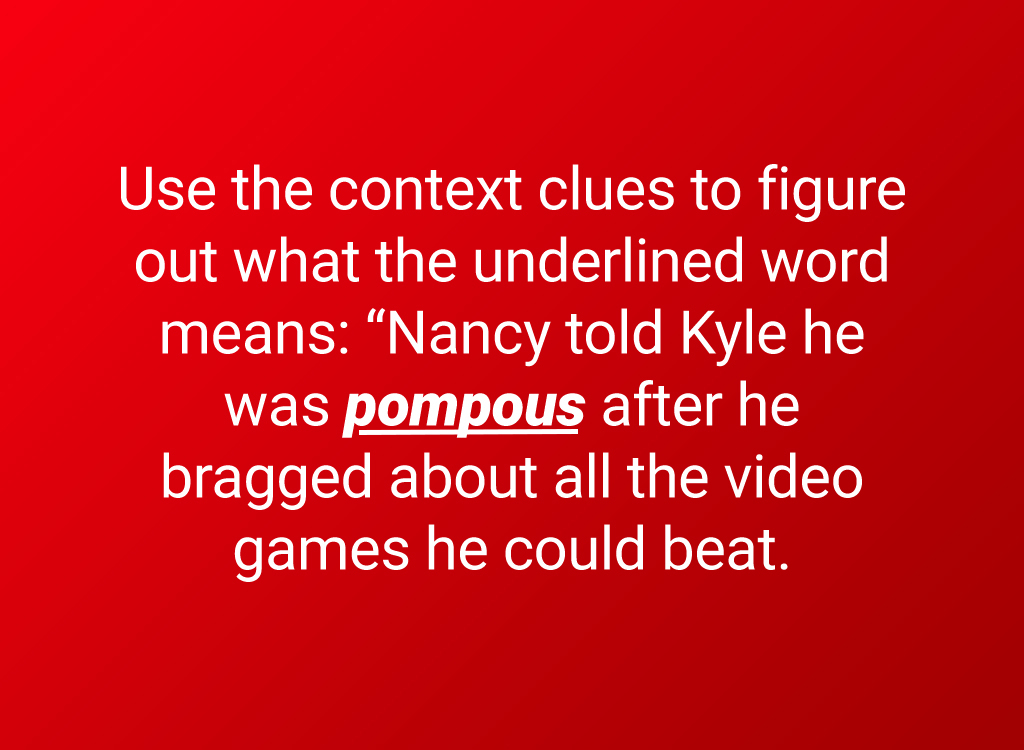
Even if you don’t know what a particular word means, you can often figure it out based on other descriptive words in the sentence.
Answer: “Arrogant,” “conceited,” or “smug”
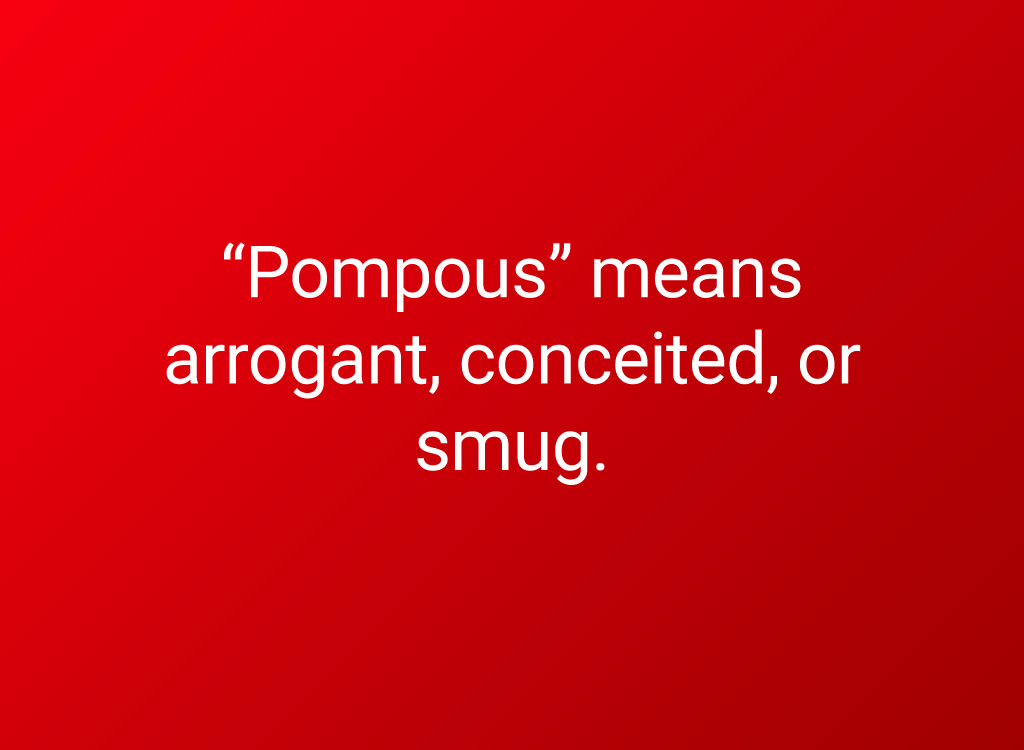
Since we know Kyle bragged about his gaming skills, we can infer that someone who is pompous thinks very highly of themselves and isn’t afraid to tell everyone about how great they are.
Question: Find the subject pronoun(s).
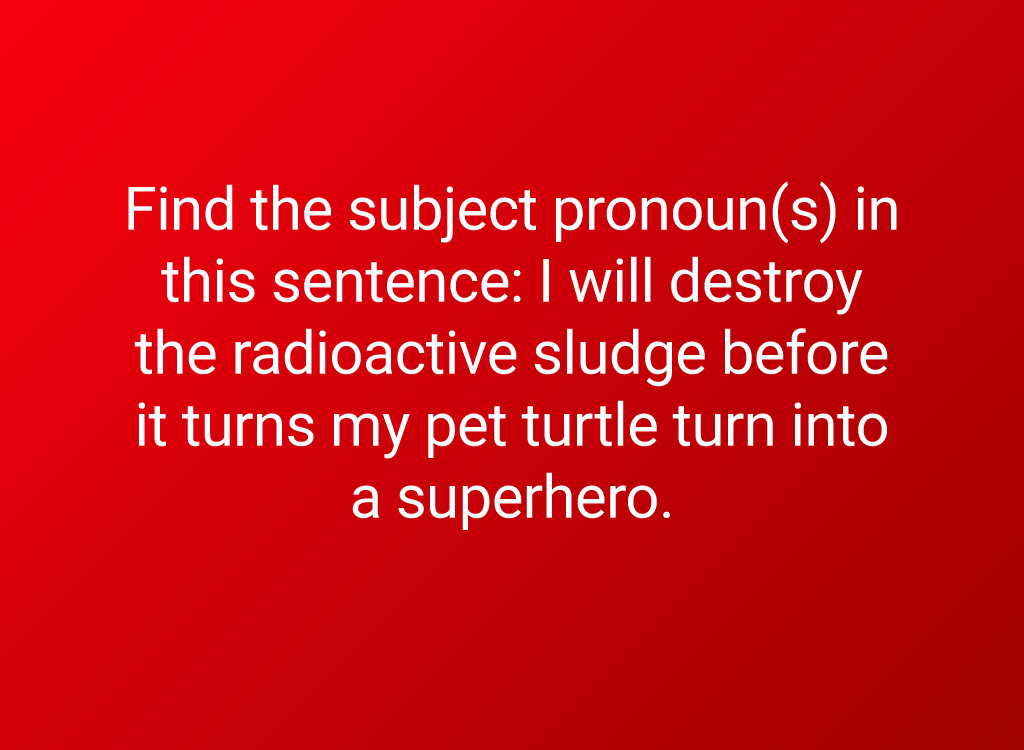
A pronoun is a word that takes the place of one or more nouns. And for more ways to strengthen your vocabulary, check out The Fascinating Origins of These 30 Common Words.
Answer: “I” and “it”
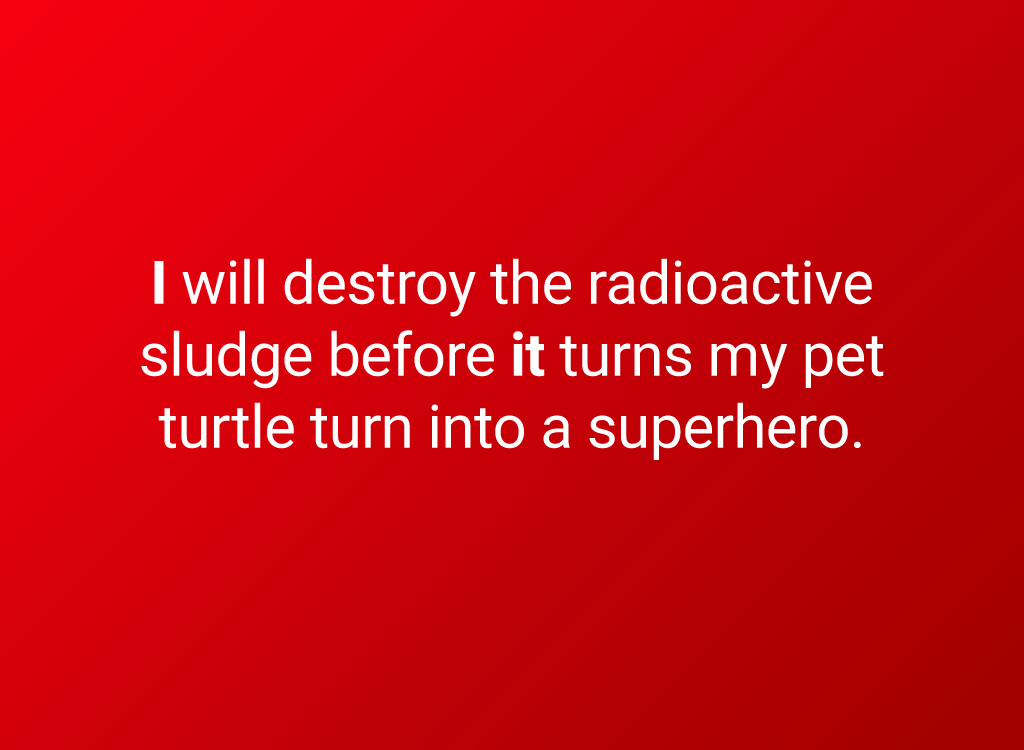
A subject pronoun acts as the subject for a verb; it is the thing which performs the action. In this case, “I” is the subject of “will destroy” and “it” is the subject of “turns.”
Question: What two things is the metaphor comparing?
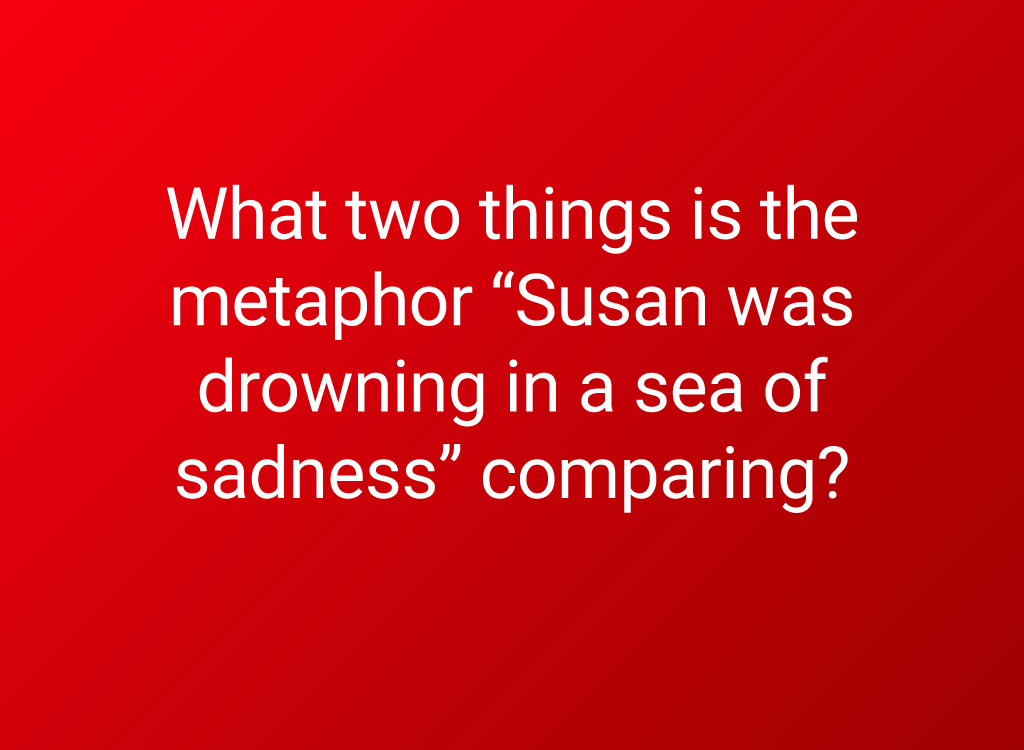
A metaphor is a figure of speech that compares two or more things, usually using the word “is” or “was.”
Answer: “Susan’s sadness” to the “sea”
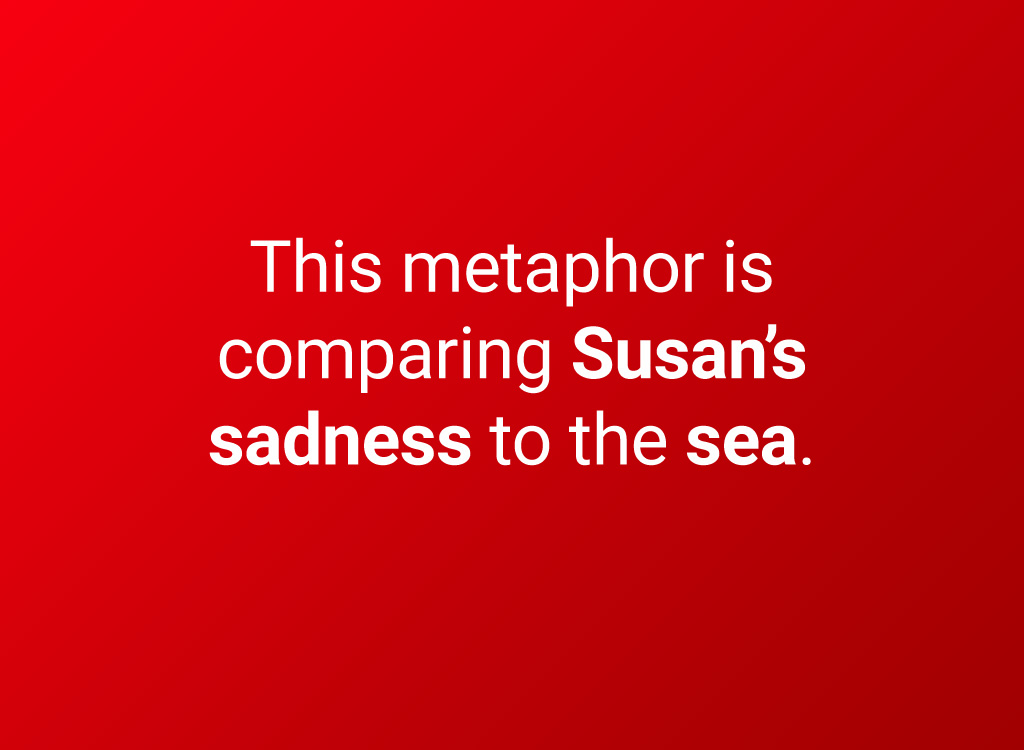
Figures of speech use words in a non-literal way. Susan is not really drowning, nor is she in the sea. However, the writer wants us to know that Susan is so sad that her sadness is as big as the ocean, and it makes her feel helpless in the way that drowning would. And for more on the power of words, check out The 15 Hardest Words to Pronounce in the English Language.
Question: Pair together the synonyms.
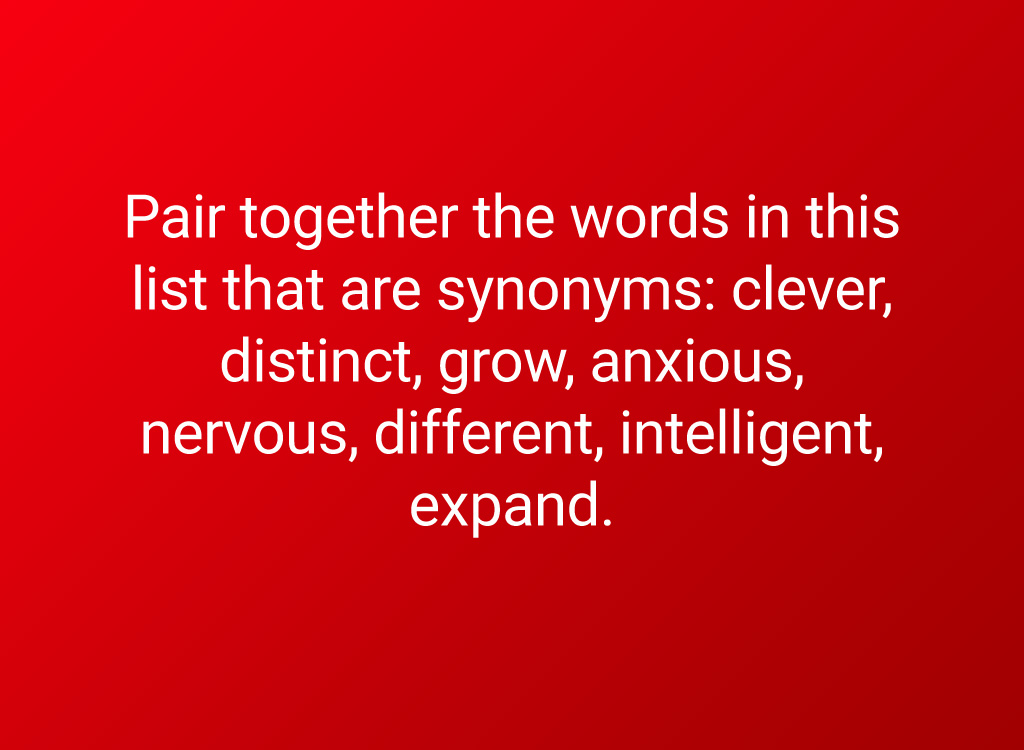
If you don’t know what synonyms are, let the verb “pair” and the list of words be your context clues.
Answer: There are four pairs of synonyms.

Synonyms are words that have the same or very similar meanings.
Question: Identify the dependent clause.
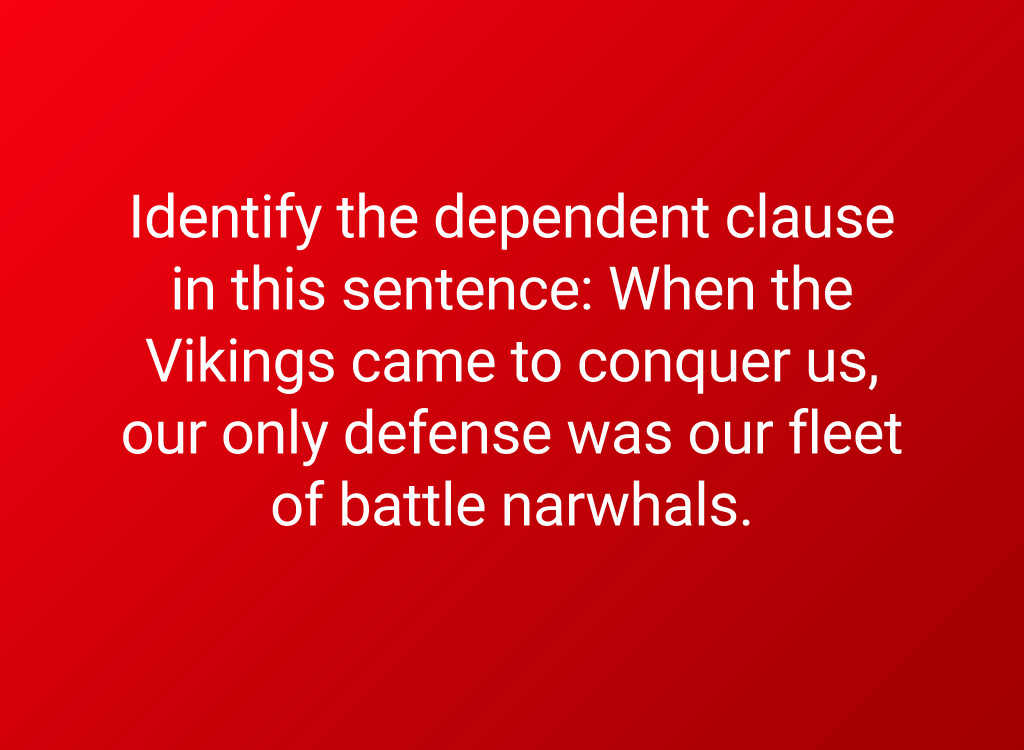
A dependent clause is one that cannot stand on its own as a sentence.
Answer: “when the Vikings came to conquer us.”
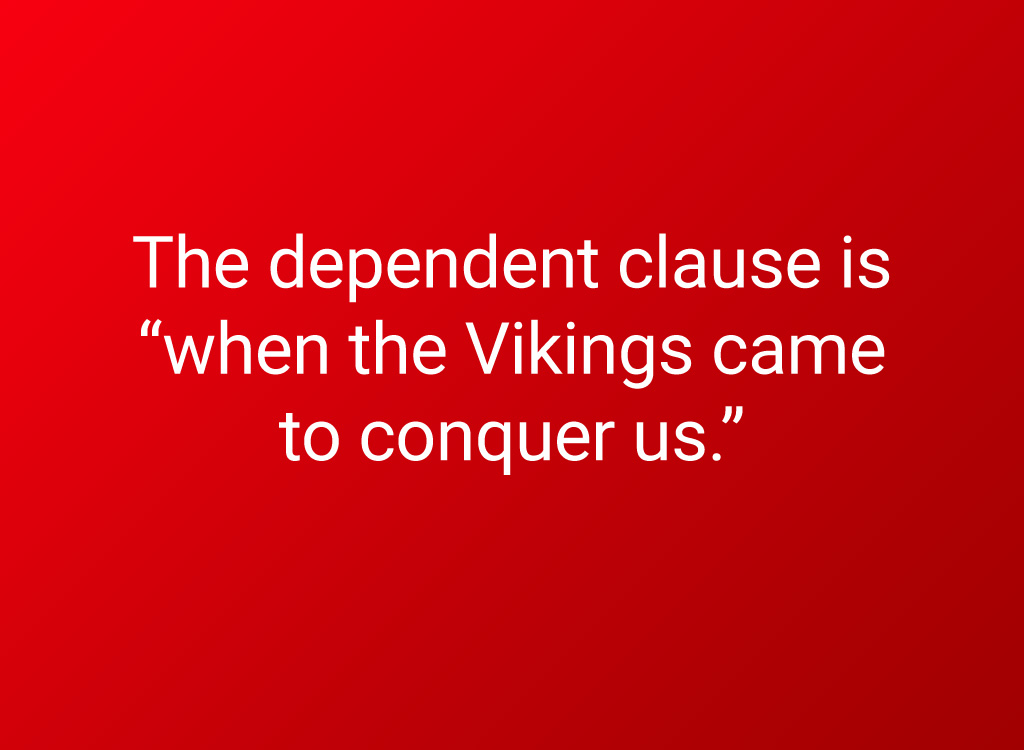
Because of the adverb “when” at the beginning, this is a dependent clause even though it has a subject and a verb.
Question: Identify the subject complement.

A subject complement is an adjective, adverb, or pronoun that follows the linking verb and describes the subject of the sentence.
Answer: “hungry”
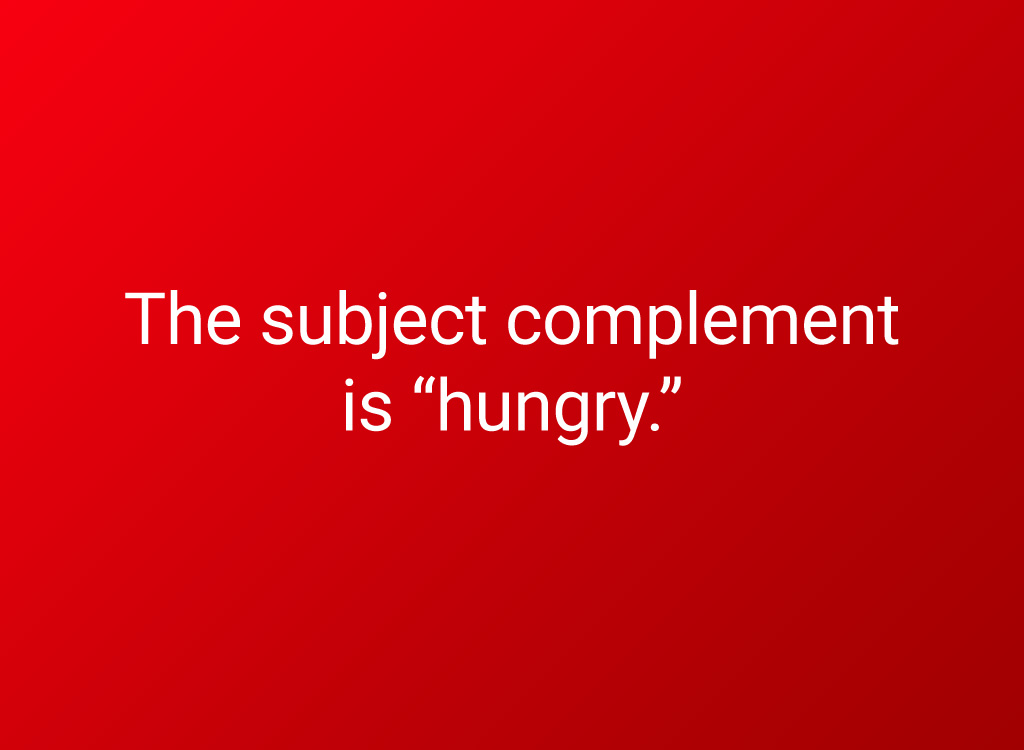
First find the subject of the sentence—in this case, “we.” Then, identify the linking verb: “will be.” What will we be? Hungry!
Question: Put commas in the correct place(s).
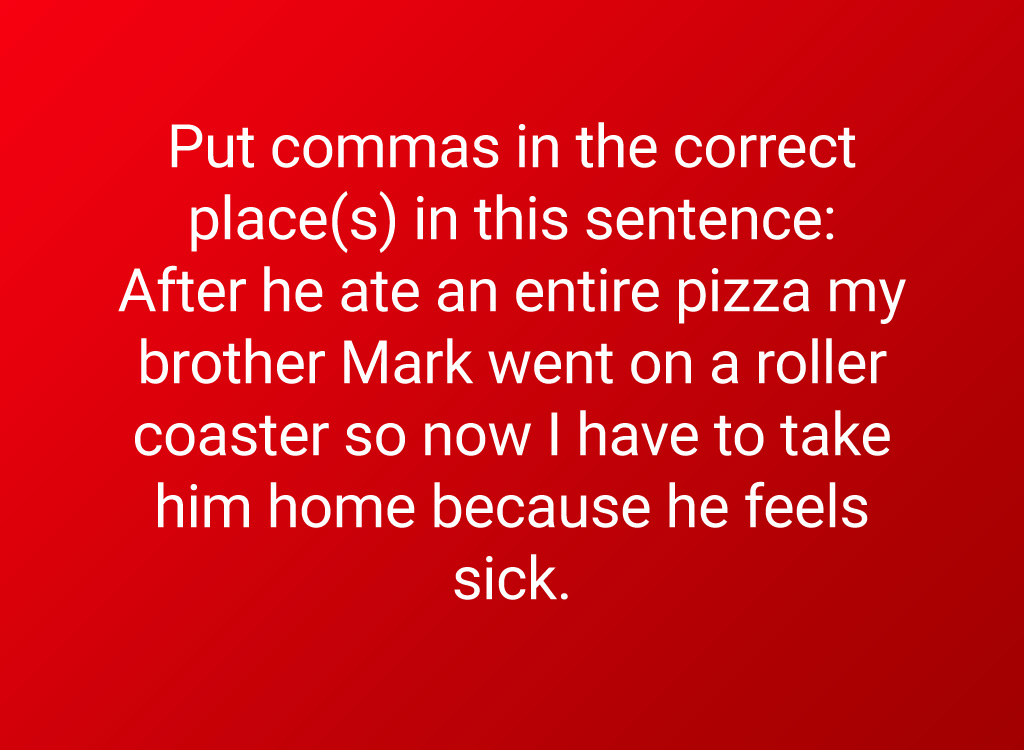
You might have heard that you need a comma every time you pause in a sentence. This isn’t always true, and may lead you to put commas where you don’t need them.
Answer: Two commas are needed.
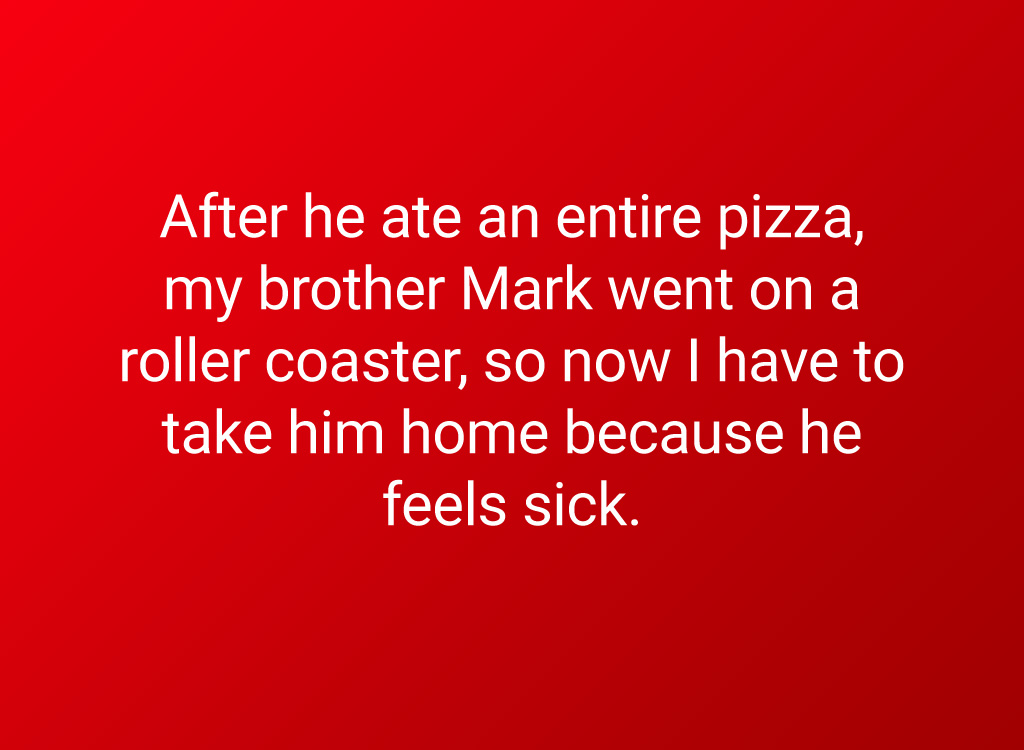
The only commas that are needed in this sentence are after the dependent clause that starts the sentence (“after he ate an entire pizza”) and before the coordinating conjunction “so.”
Question: Identify and explain the personification.
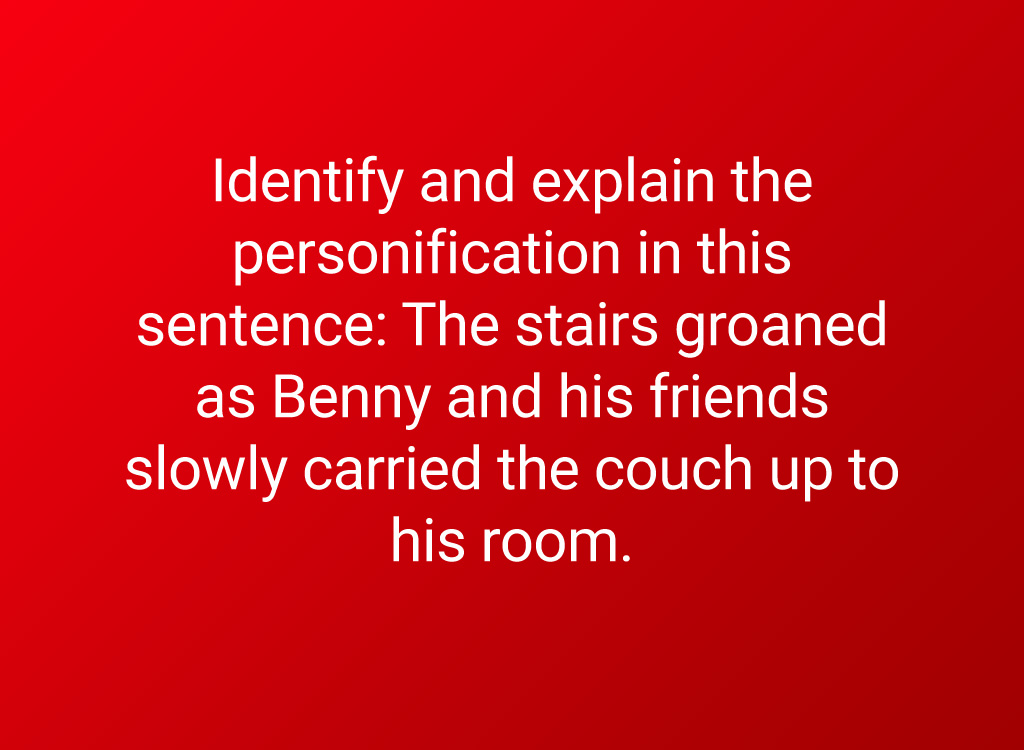
Personification is a figure of speech that gives human qualities, actions, or emotions to non-human objects.
Answer: “The stairs groaned”
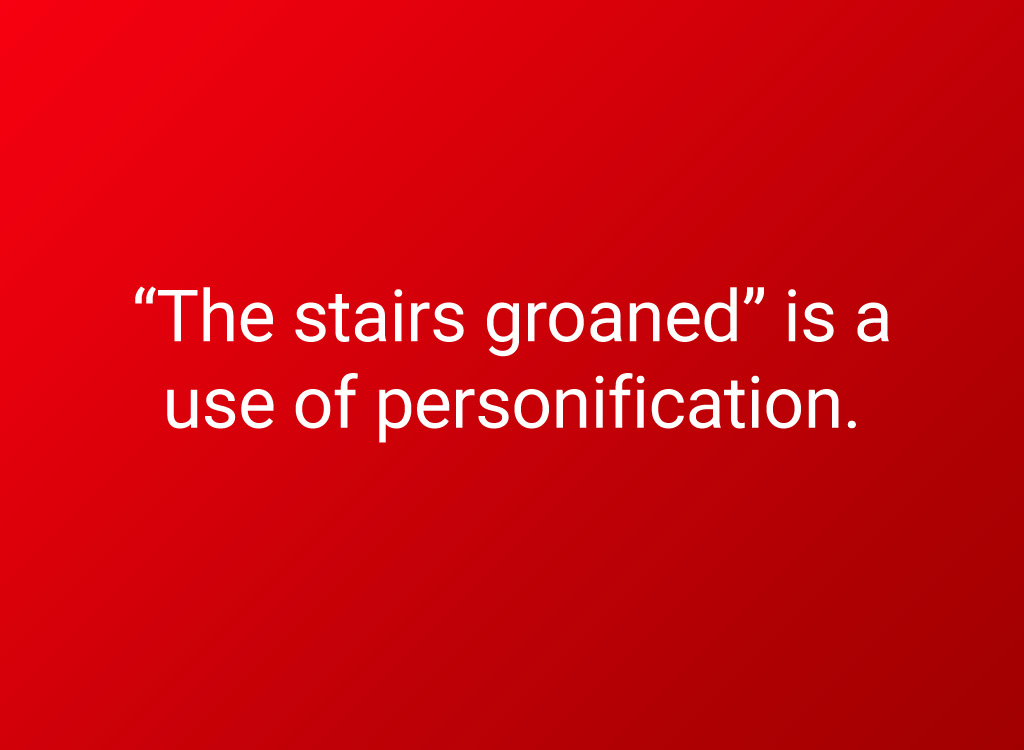
Stairs, of course, have no mouth and can’t groan. However, they may make a sound like groaning when several people walk on them while carrying a heavy object.
Question: Find all the adjectives.
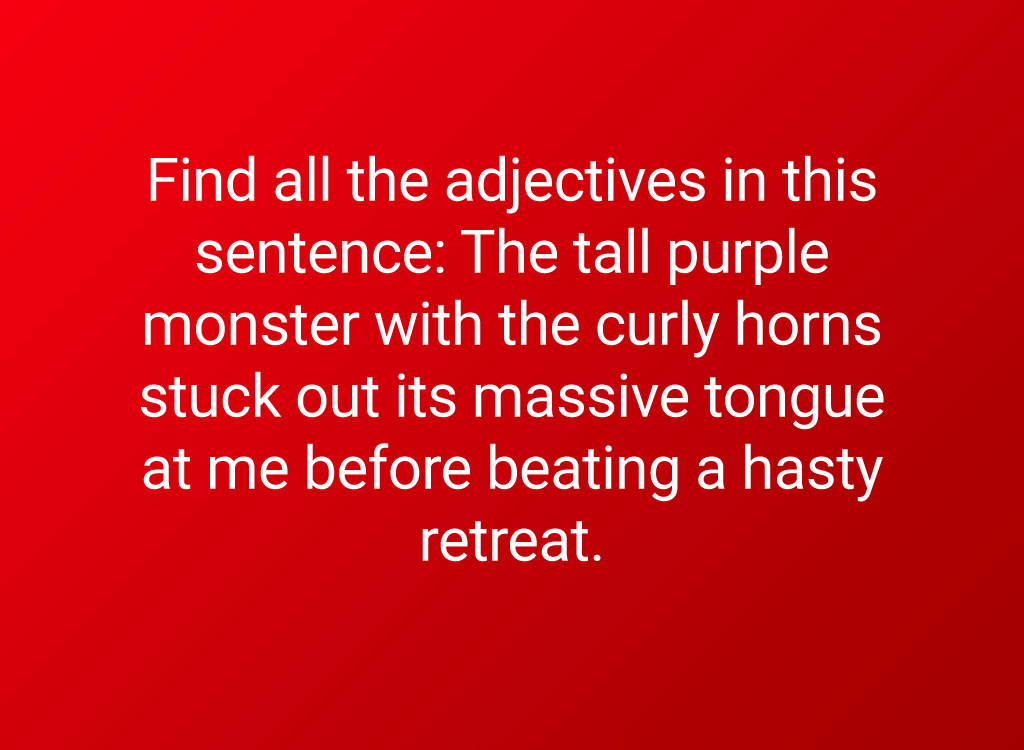
Adjectives are descriptive words that give more information about the noun or noun phrase they modify.
Answer: There are five adjectives.
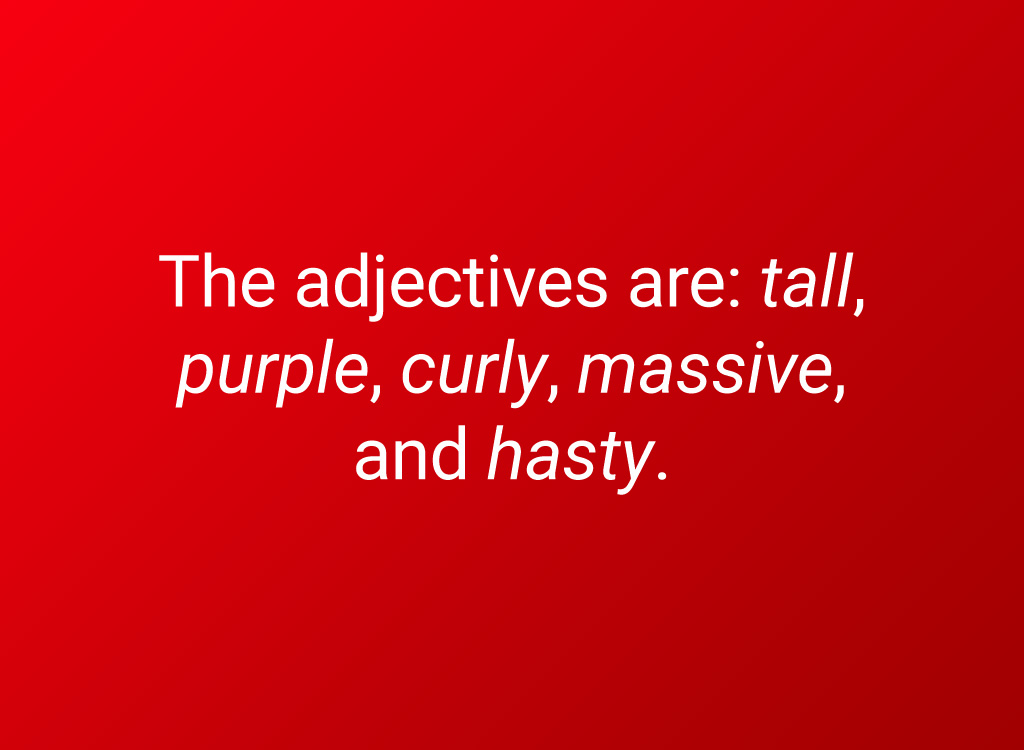
In this sentence, the adjectives describe the nouns “monster” (tall, purple), “horns” (curly), “tongue” (massive), and “retreat” (hasty).
Question: Find and explain the simile.
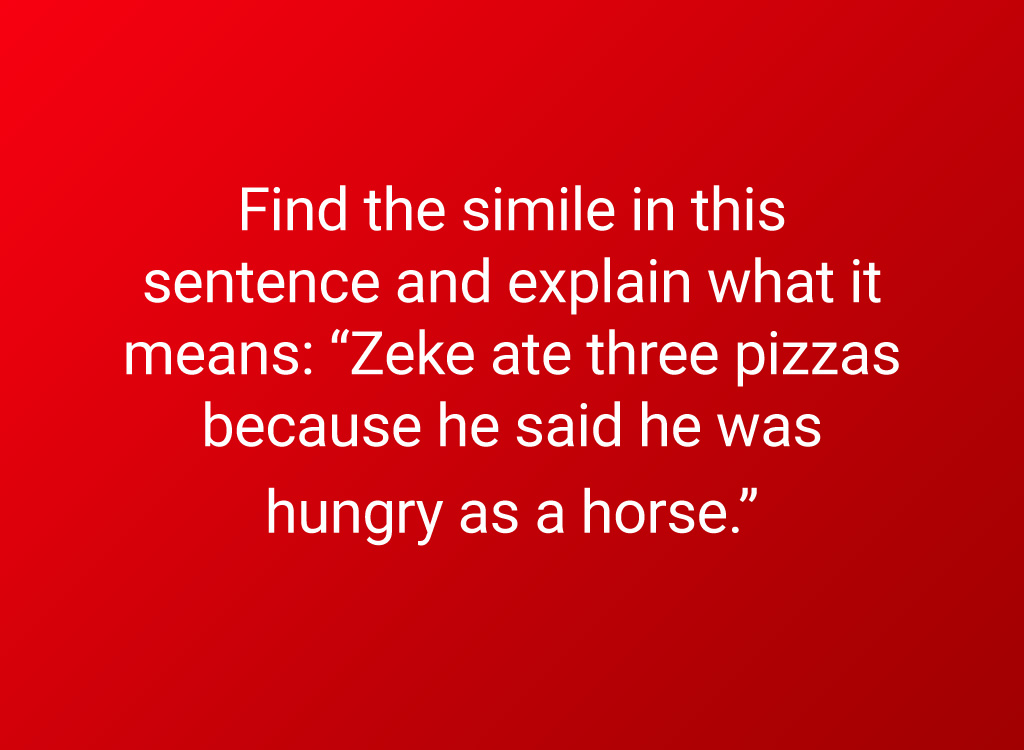
A simile is like a metaphor in that it is a figure of speech that compares two things, but a simile deploys the word “like” or the word “as.”
Answer: “as hungry as a horse.”
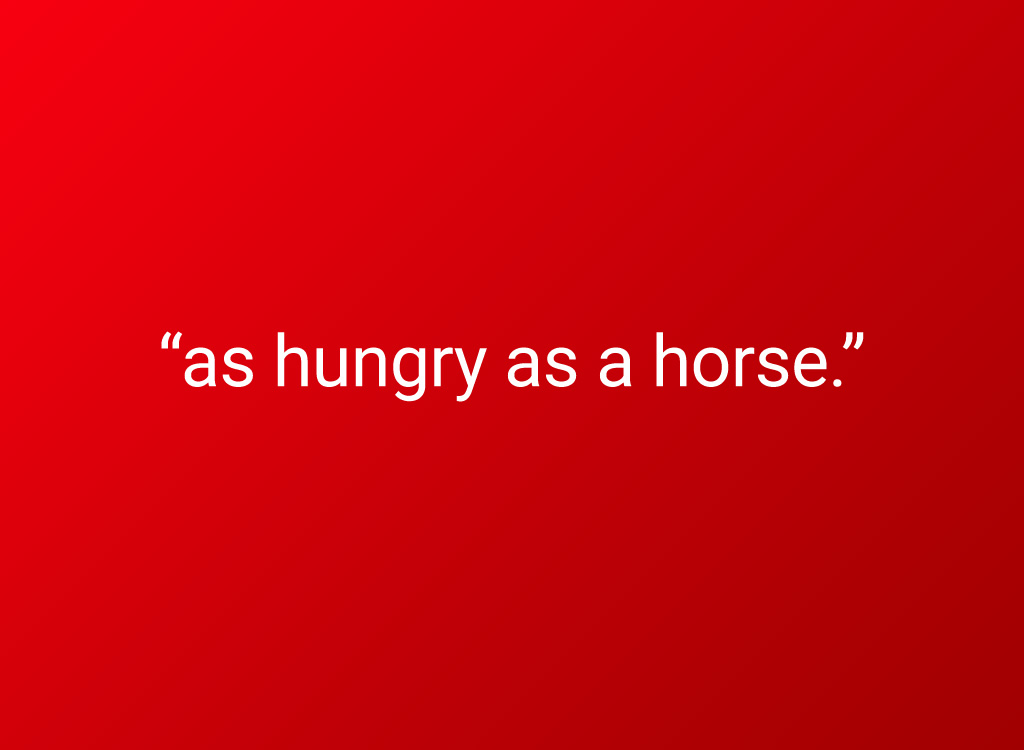
Horses are big, strong animals that need a lot of energy to run, so they must eat a lot of food to maintain that energy. Zeke used this simile to illustrate how hungry he felt.
Question: Identify the direct object.
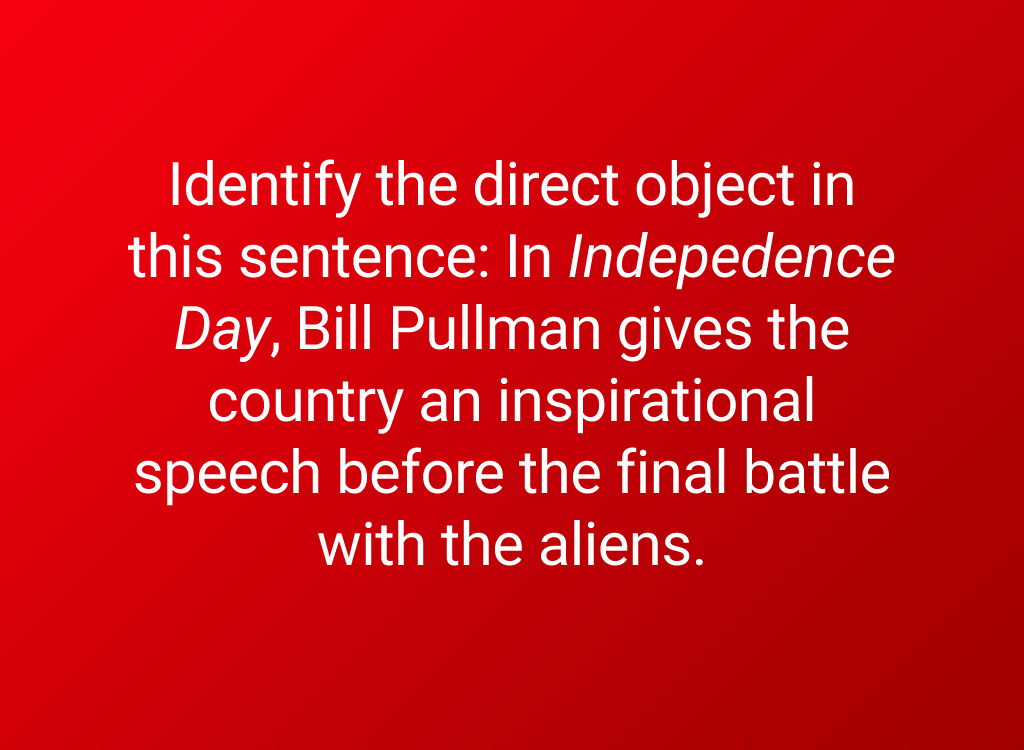
A direct object is a noun or pronoun that receives the action of the verb.
Answer: “speech”
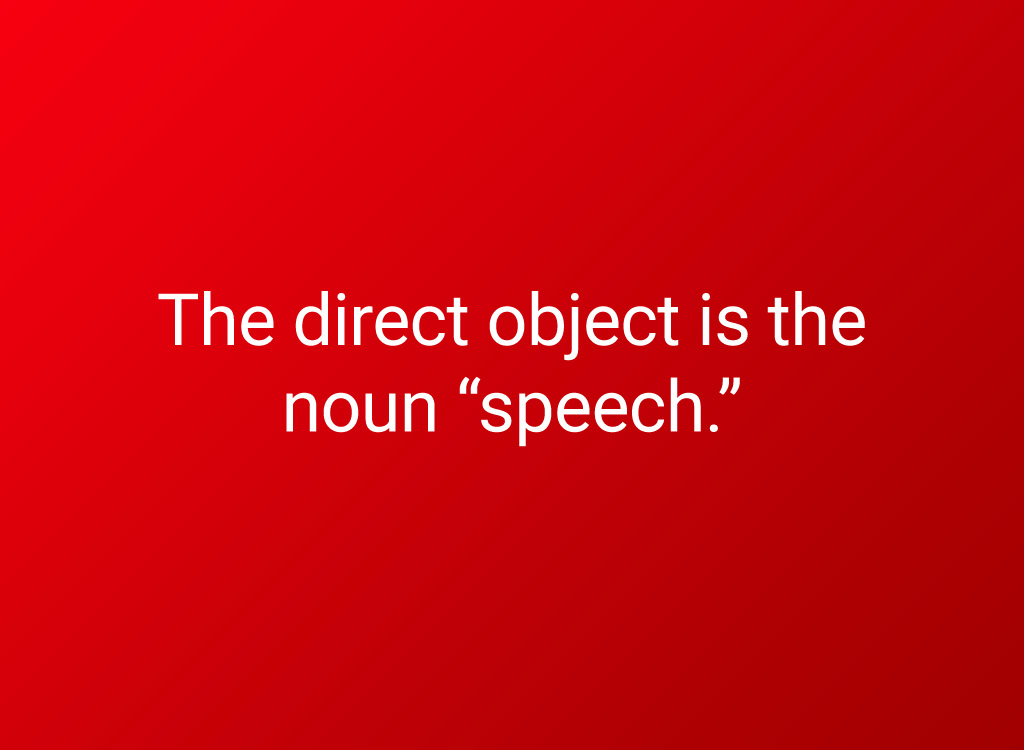
Did you guess “country”? Not quite! Pay close attention to the verb: Bill Pullman doesn’t give the country, he gives the speech.
Question: Find the alliteration.
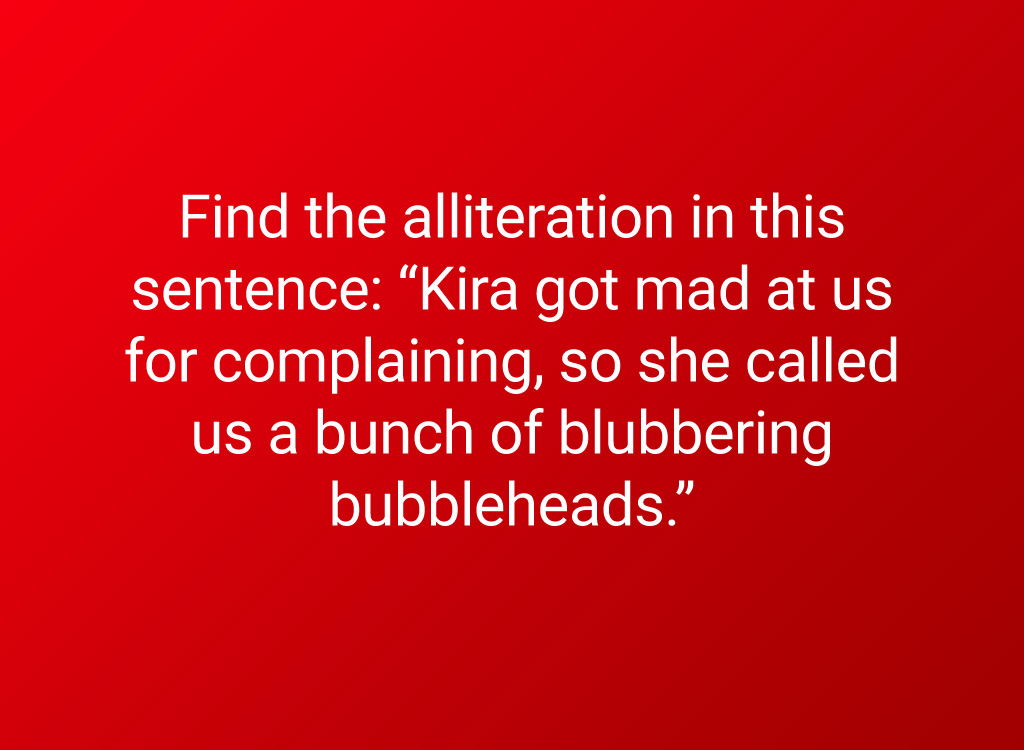
Alliteration isn’t a figure of speech, but rather a literary device that draws attention to certain words and sounds.
Answer: “a bunch of blubbering bubbleheads.”
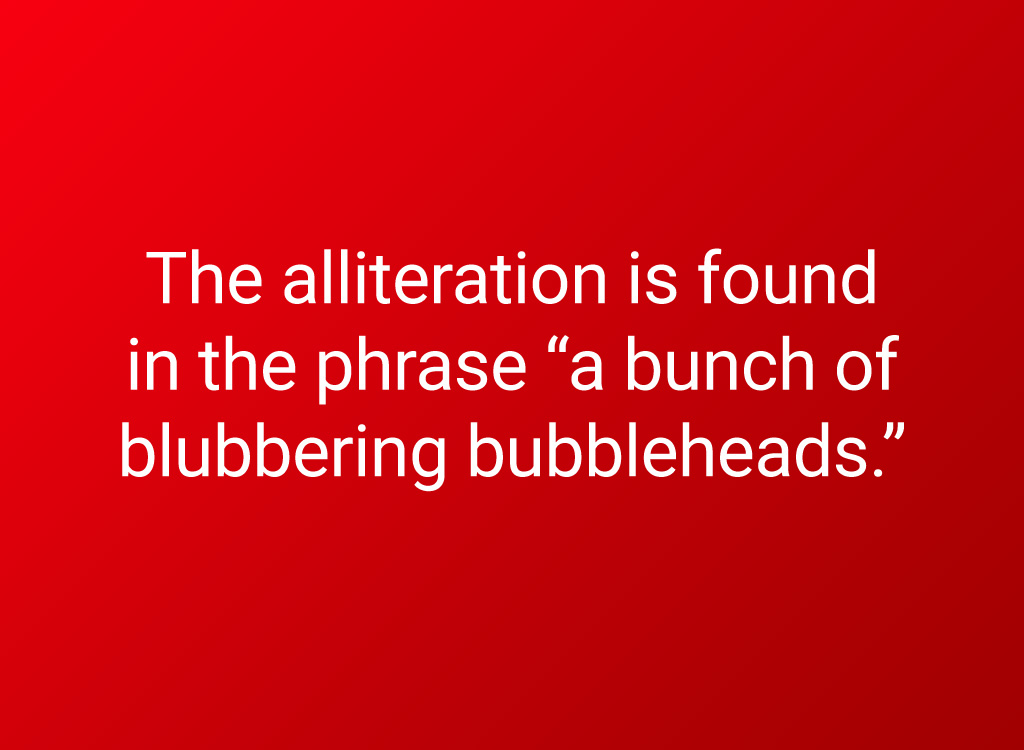
Alliteration is the repetition of a consonant sound, like P or B, at the beginning of a group of words. “Peter Piper picked a peck of pickled peppers” is almost entirely alliteration.
Question: Find the appositive.
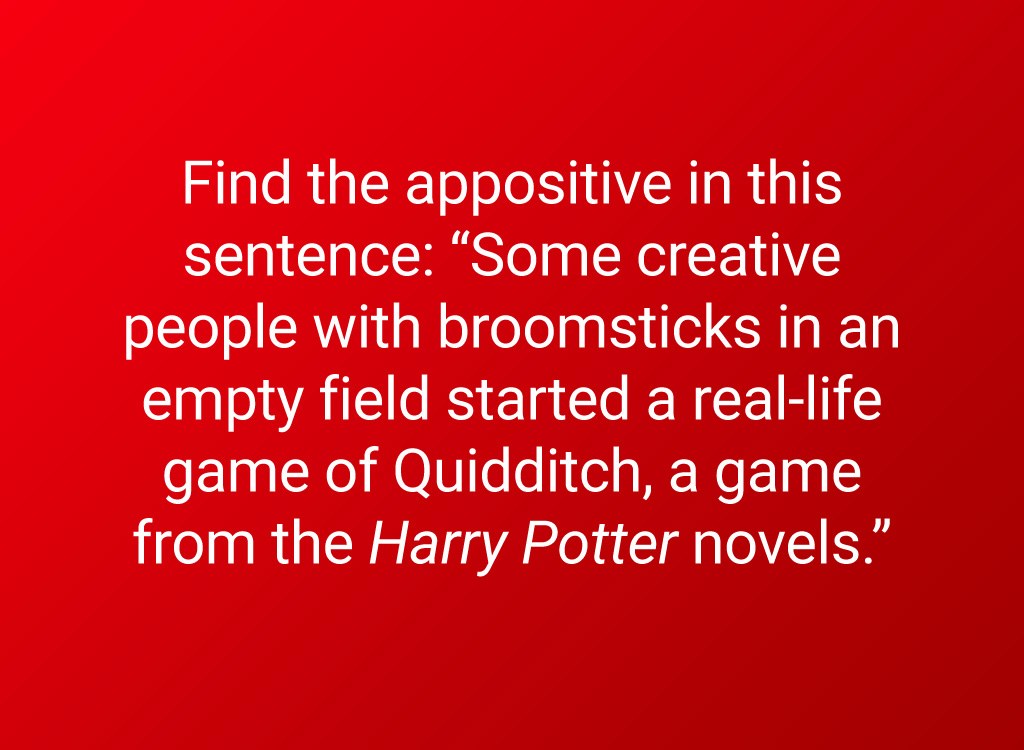
An appositive is a word or phrase that gives extra information about a noun. It can describe any noun in the sentence, not just the subject.
Answer: “a fictional game from the Harry Potter novels.”
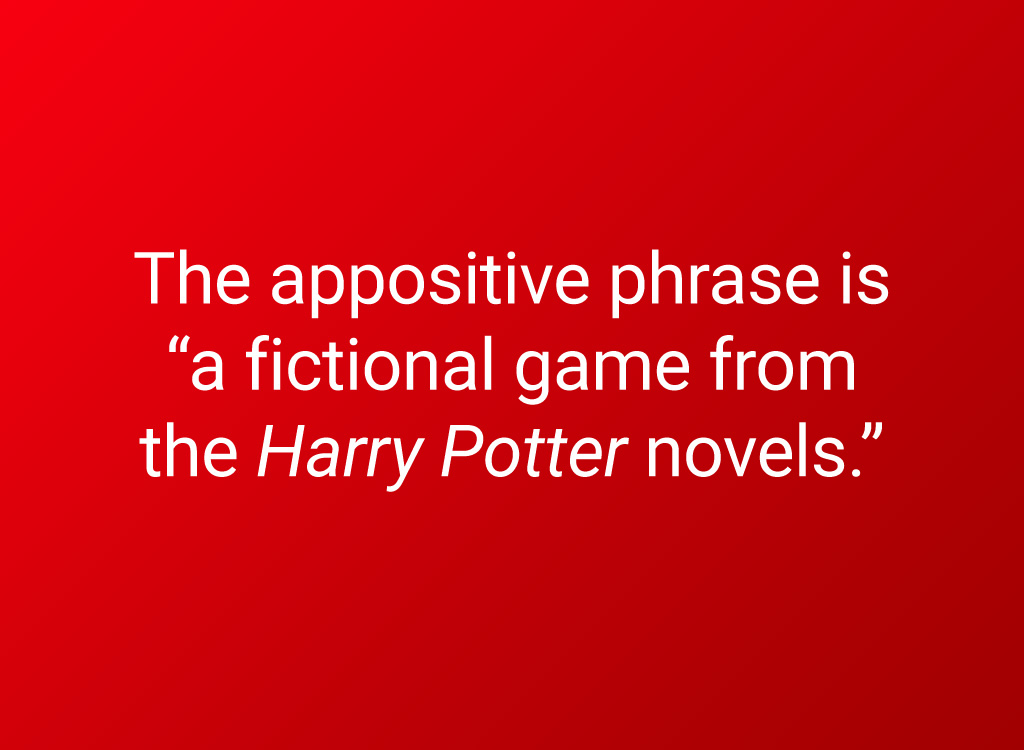
In this case, the appositive is describing the noun “Quidditch.” Not all appositives come directly after the noun or require commas, but many do.
Question: Pair together the antonyms.
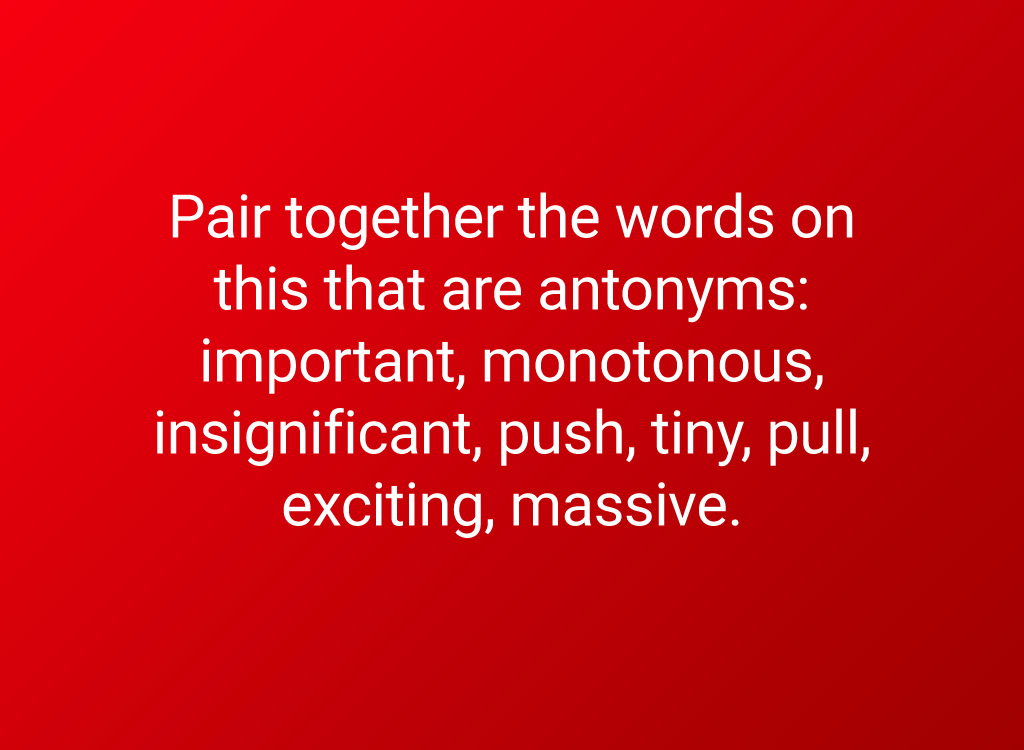
If you remember what synonyms are, what could antonyms be?
Answer: There are four pairs of antonyms.

Antonyms are words that have opposite meanings.
Question: Identify the indirect object.
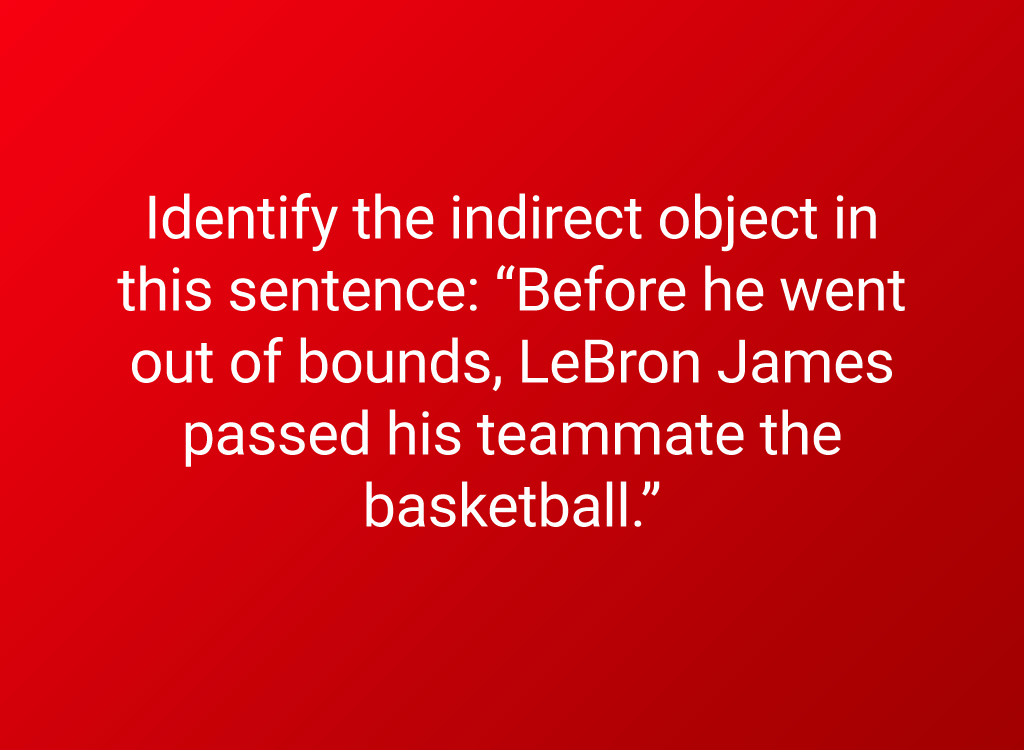
Remember the direct object? The indirect object is a noun or pronoun that receives the direct object.
Answer: “teammate”
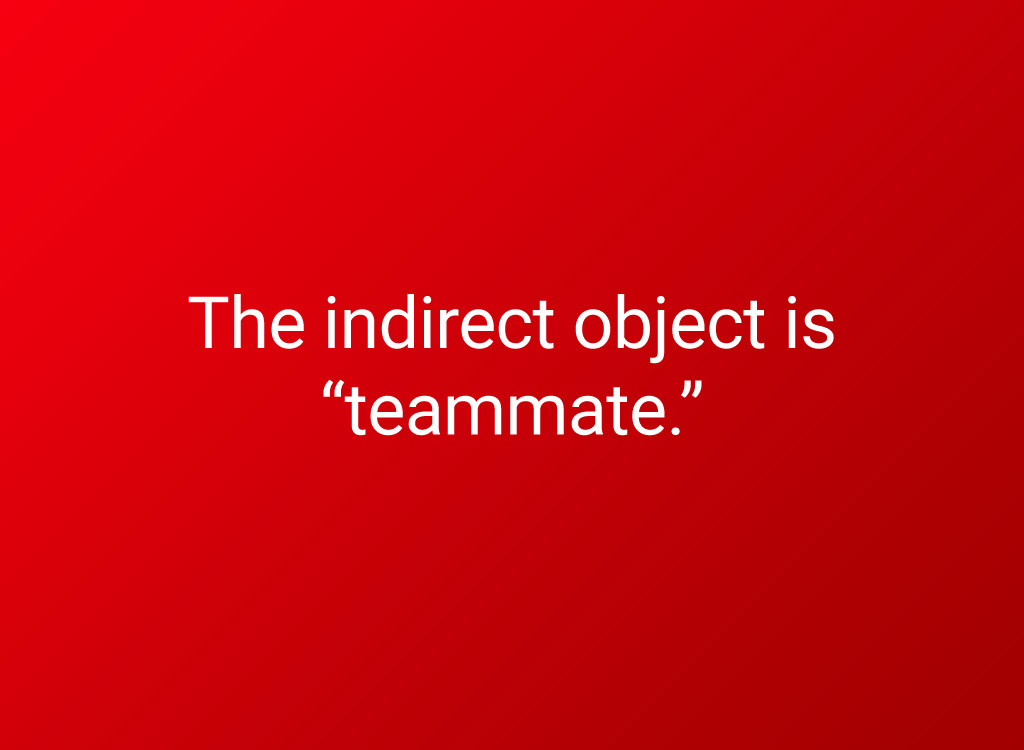
In this case, the direct object is the basketball, since that is what LeBron James passed. Who received it? His teammate.
Question: Identify and fix the use of the incorrect homophone(s).
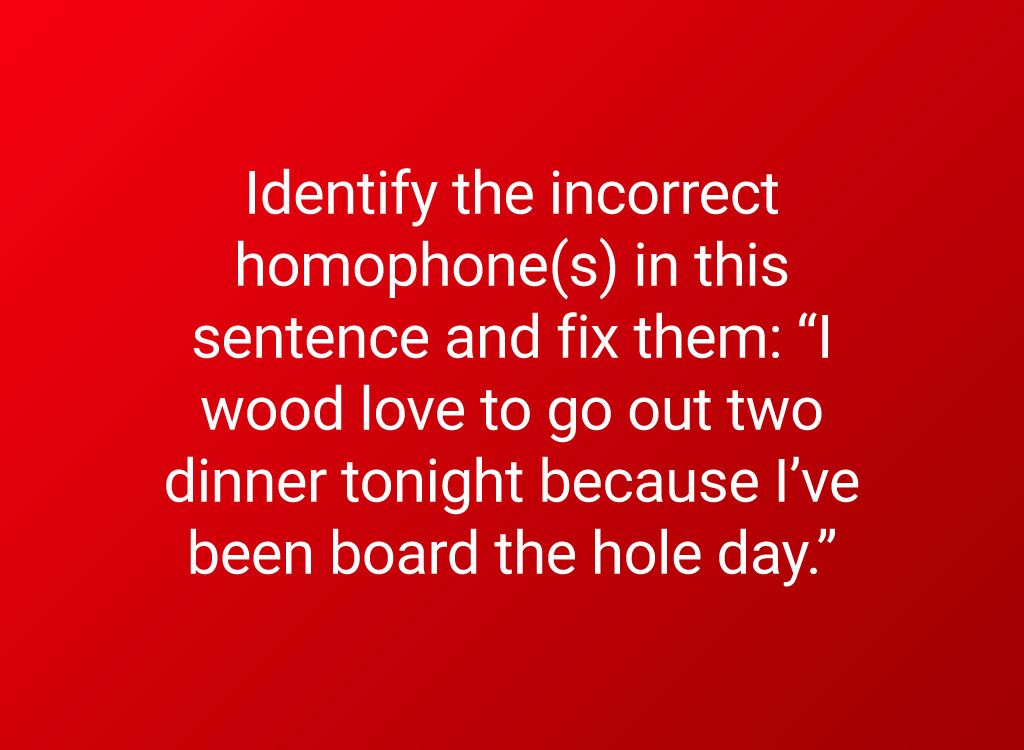
Homophones are words that sound the same but have different meanings.
Answer: “wood,” “two,” “board,” “hole”

All the homophones in this example have different spellings, but not all homophones do. For example, “bowl” can mean what you eat your cereal out of or what you do with a bowling ball.
Question: Find the preposition(s).
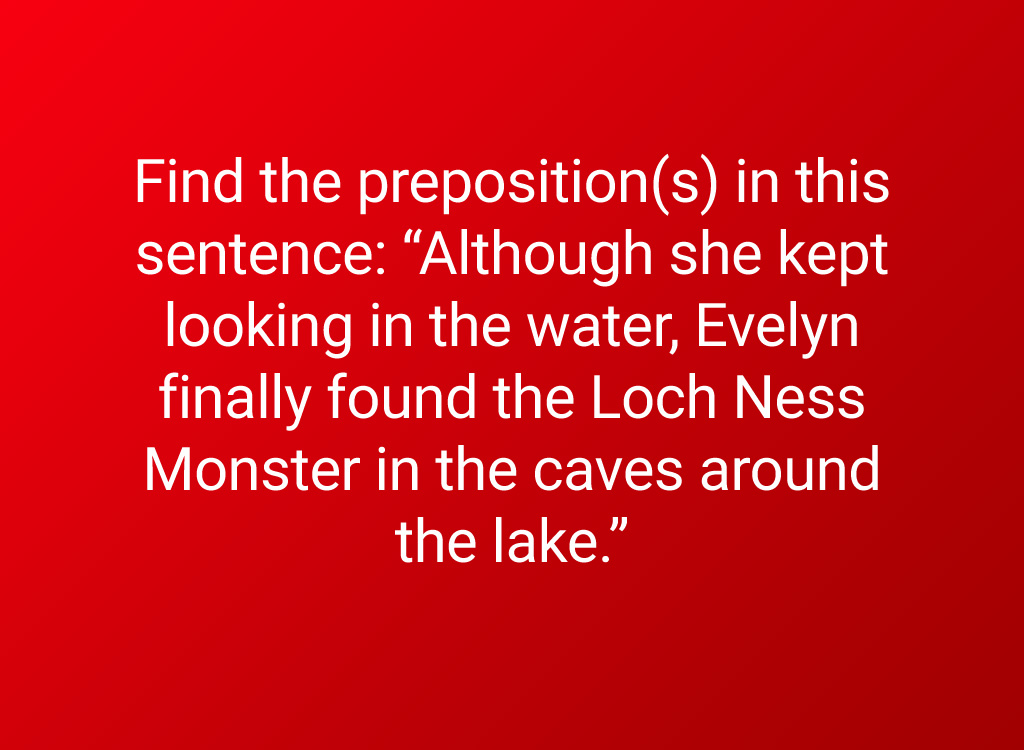
Prepositions usually combine with noun phrases to tell where, when, or how something happened.
Answer: “in,” “in,” “around”

All these prepositions tell us where Evelyn looked.
Question: Pick the correct word for each blank.
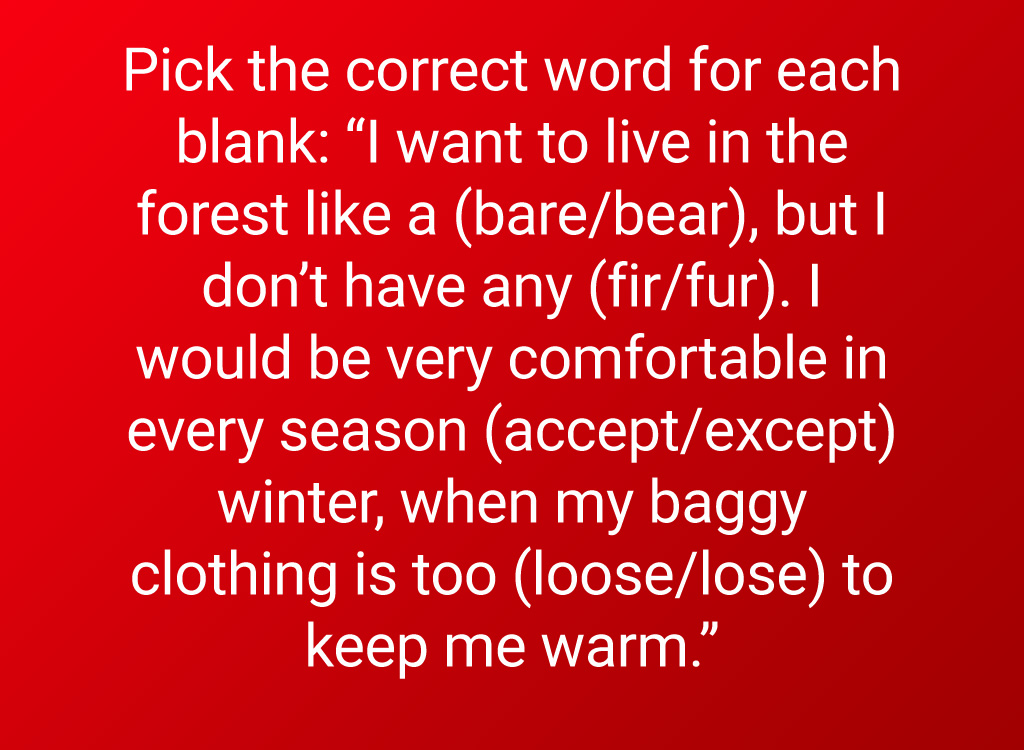
When two words sound the same or have similar spellings, you need to pay close attention to pick the right one.
Answer: “Bear,” “fur,” “except,” “loose”
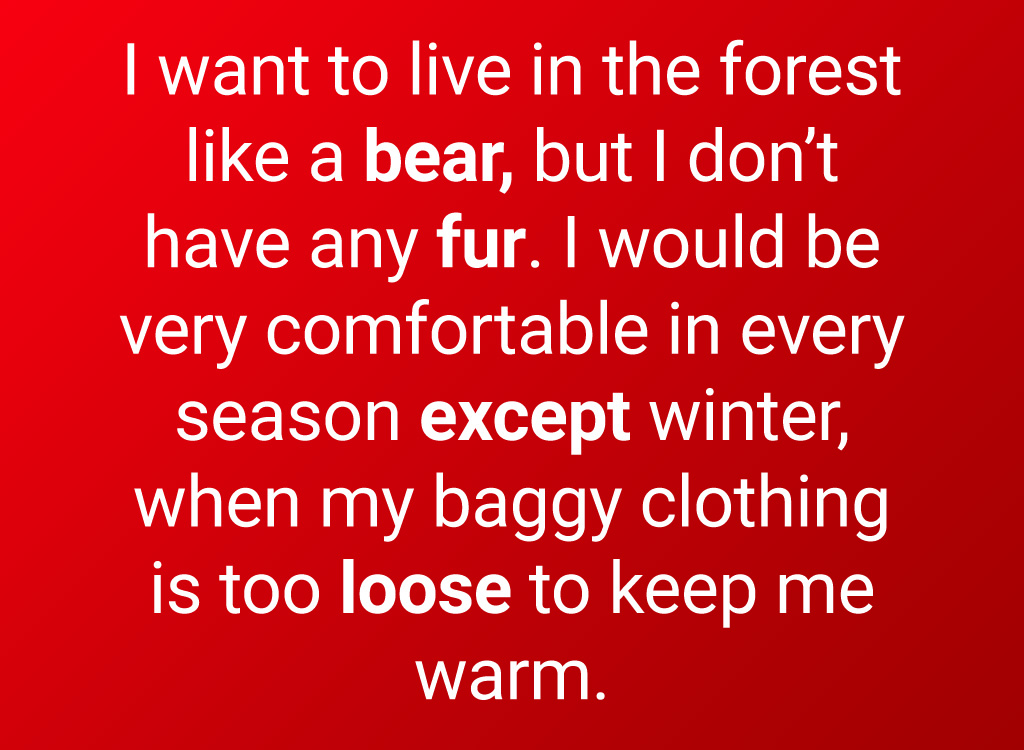
Bear is the noun for the animal that lives in the woods and hibernates, and its skin is covered with fur. Except is (in this case) a preposition that means “other than,” and loose is an adjective that means “baggy.”
Question: Find the reflexive pronoun(s).
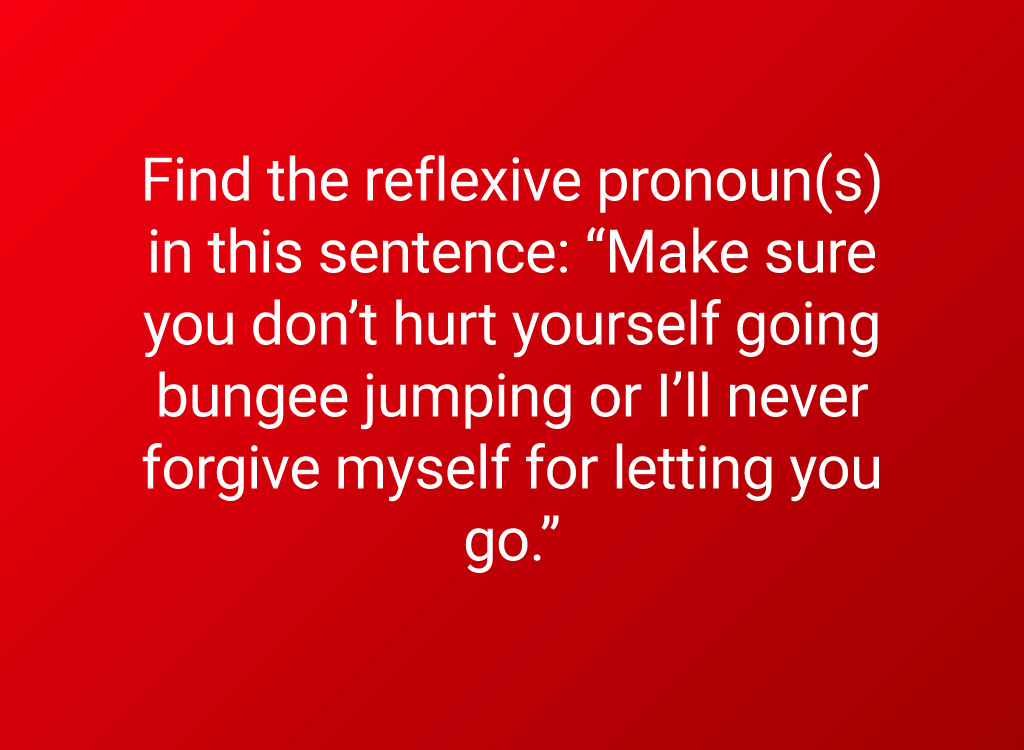
A pronoun, as we’ve already seen, is a word that takes the place of one or more nouns. Reflexive pronouns refer back to a noun or pronoun earlier in the same clause.
Answer: “yourself,” “myself”
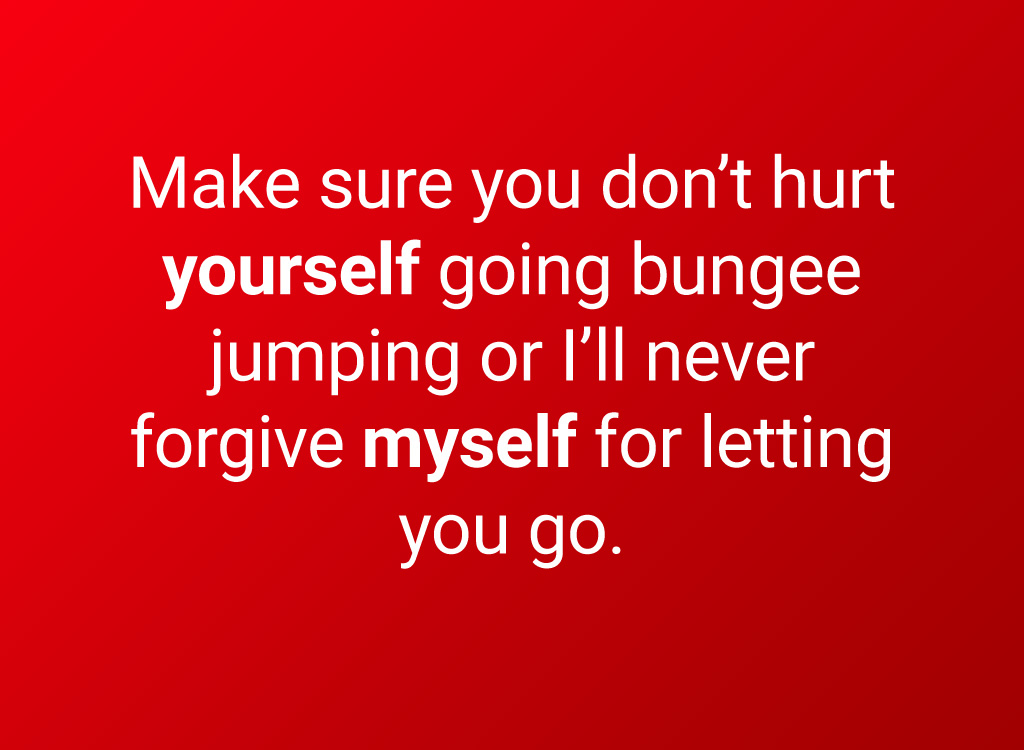
In English, reflexive pronouns always end with “-self” or “-selves” and refer to a previously named noun or pronoun, so the reflexive pronoun “yourself” refers to the personal pronoun “you.”
Question: Find and correct the errors in subject/verb agreement.
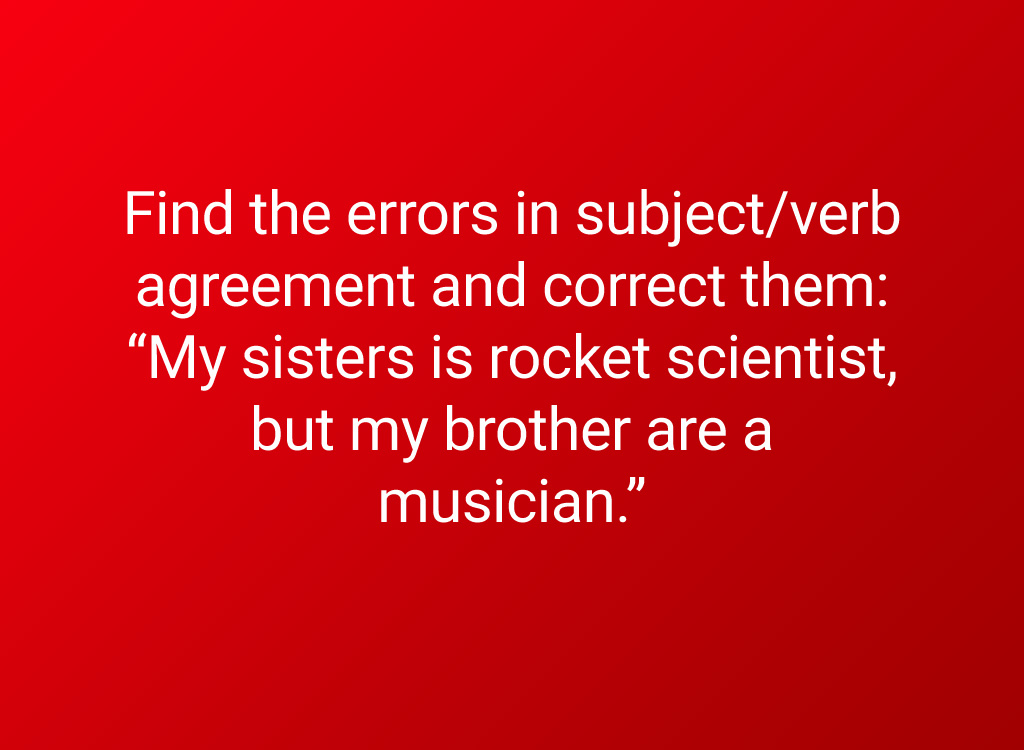
The subject and verb of a sentence must agree in number.
Answer: Swap “are” and “is.”
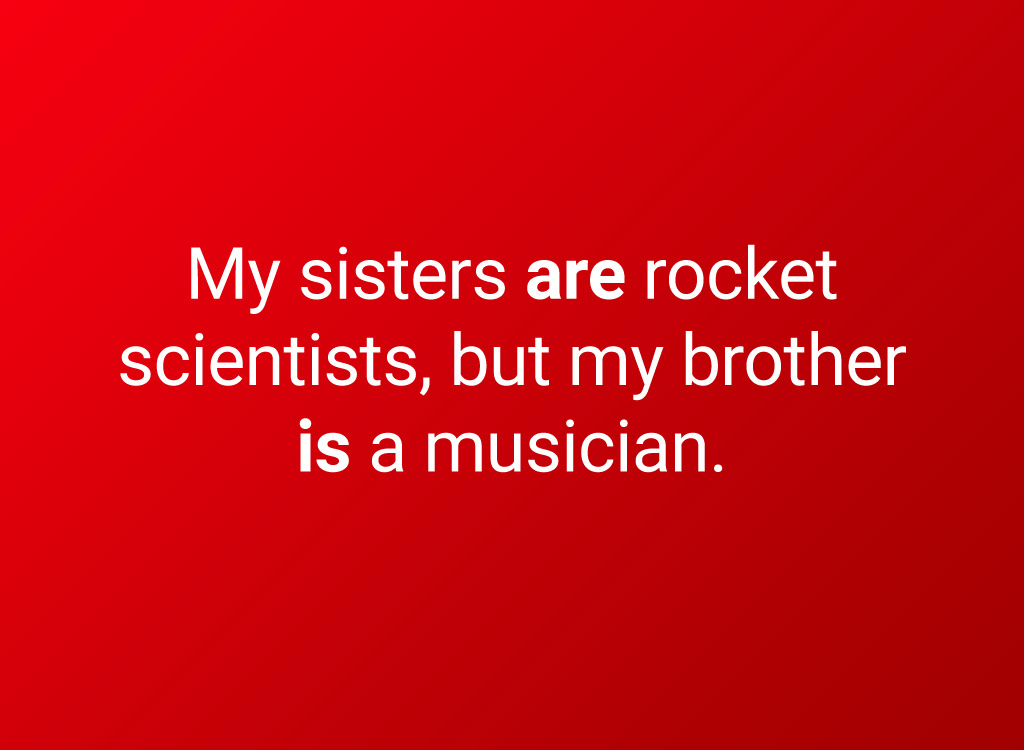
If a subject is single (“brother”), its verb must be single (“is”), but if a subject is plural (“sisters”), its verb must also be plural (“are”).
Question: Find the hyperbole.
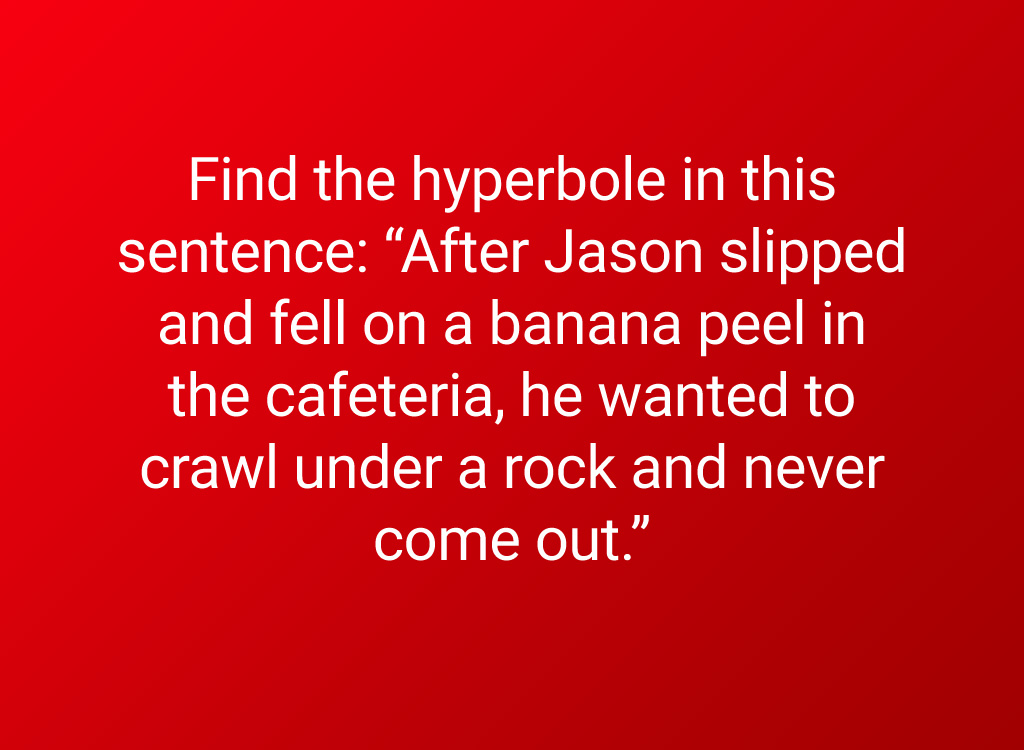
Hyperbole (pronounced high-PUR-bow-lee) is a figure of speech that uses exaggeration.
Answer: “he wanted to crawl under a rock and never come out”
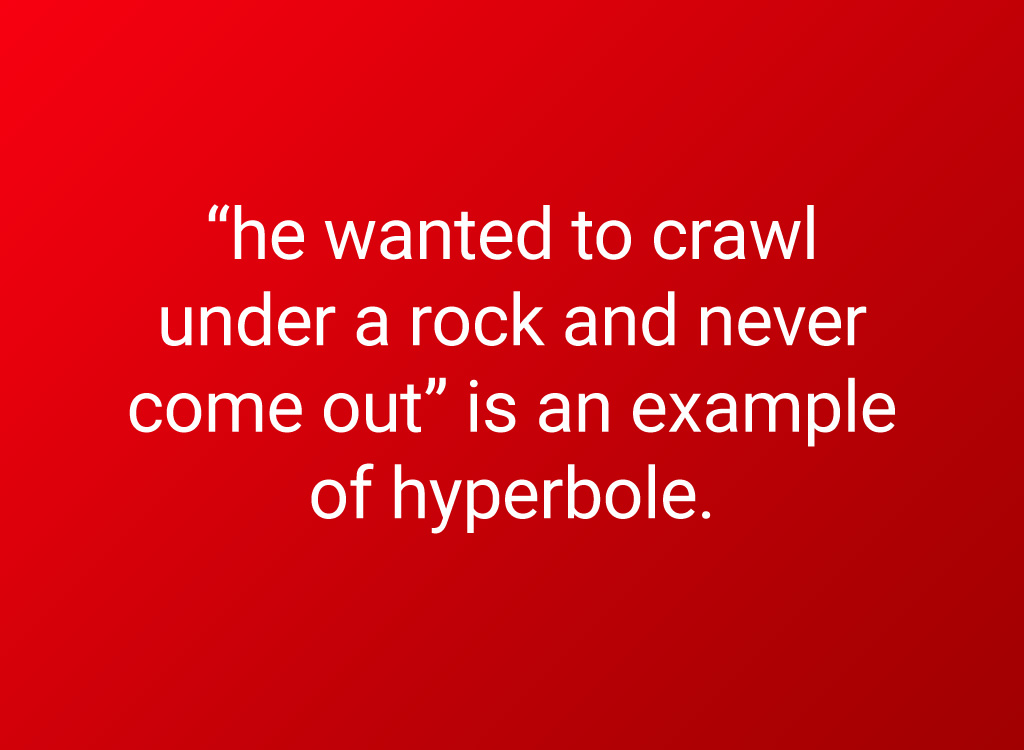
As embarrassed as Jason was after slipping and falling, it is unlikely that he would literally want to live under a rock. However, the writer has exaggerated his feelings to help the reader understand how strong they are.
Question: Find the independent clause(s).
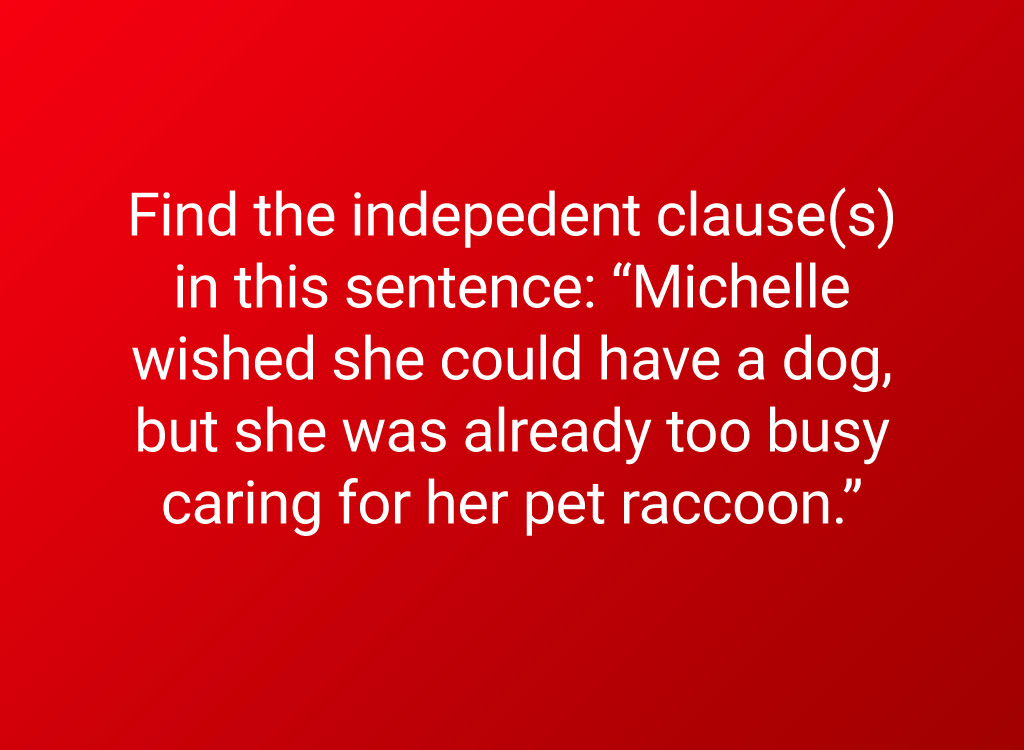
An independent clause expresses a complete thought and can stand alone as its own sentence.
Answer: There are two independent clauses.
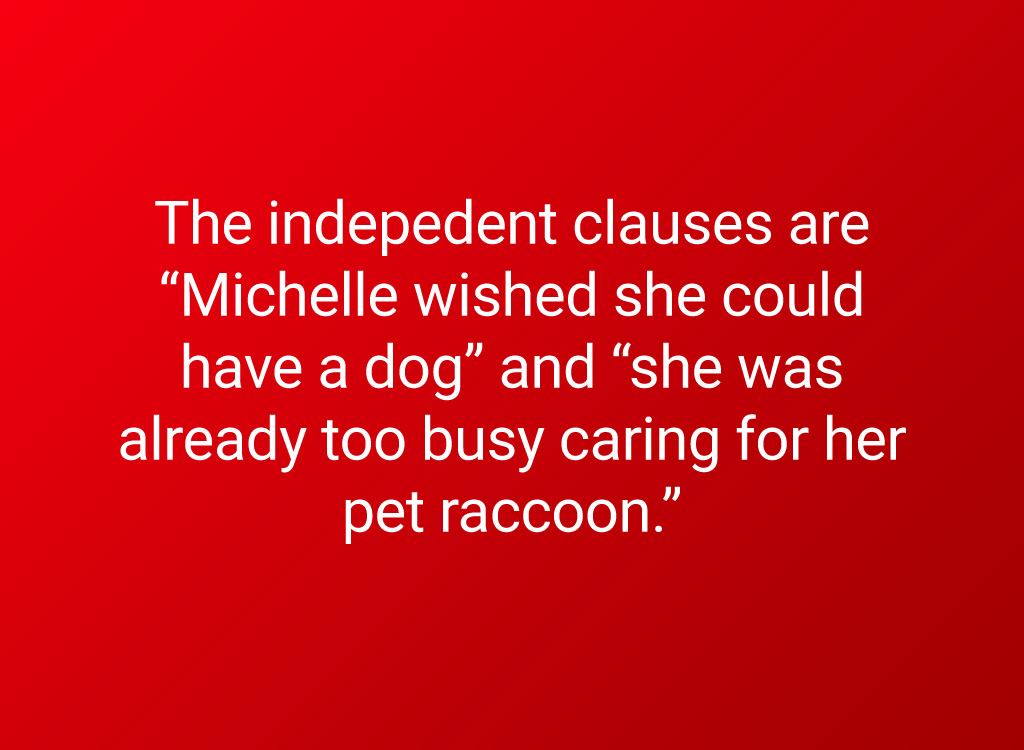
When two or more independent clauses are joined together with a coordinating conjunction (in this case, “but”), the result is a compound sentence.
Question: Put the parentheses in the right place(s.

Parentheses are used to add emphasis or give extra detail without interrupting the flow of the sentence. They always come in pairs.
Answer: There are two parenthetical phrases.

Sometimes parentheses can add extra information to the sentence (as in the case of “which I was lucky enough to see”) and sometimes they give detail in the form of dates, numbers, or acronyms (as in the case of “KSC”).
Question: Find the subject.
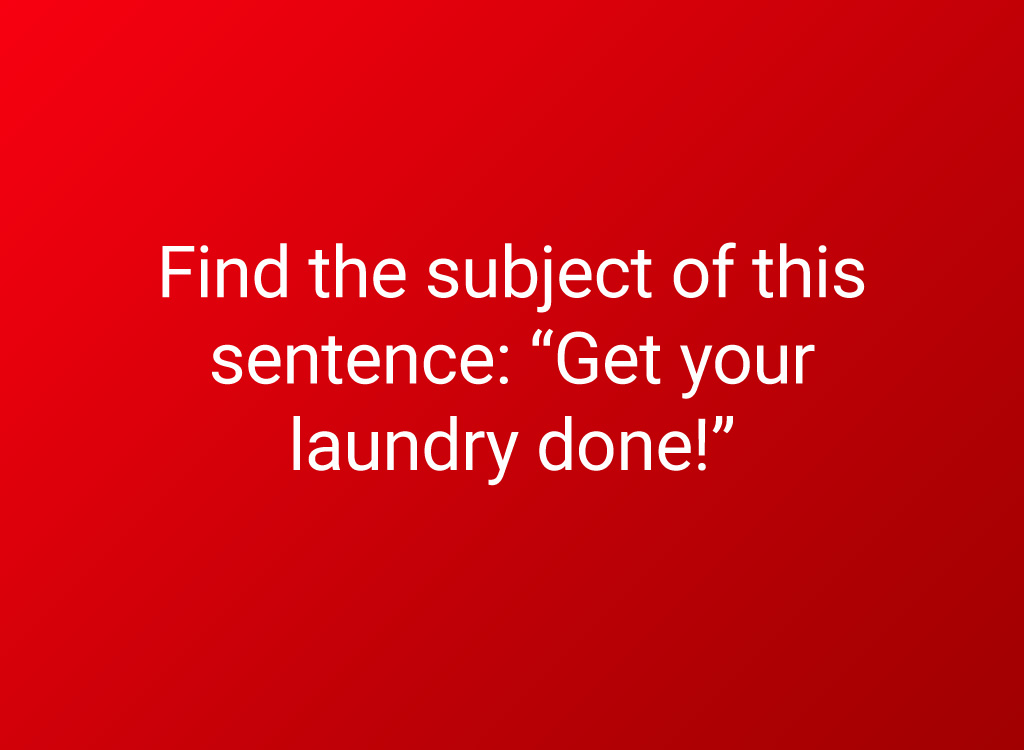
Commands like this one are called “imperatives.”
Answer: The (unwritten) subject of the sentence is “you.”
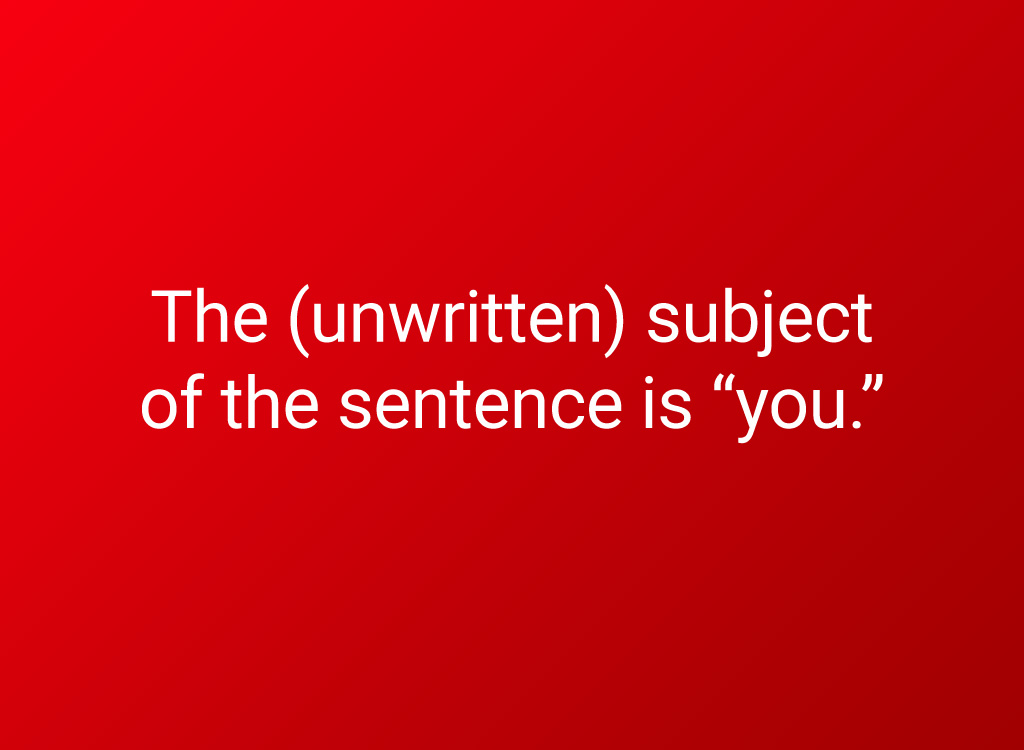
While it might seem like a trick question, imperative sentences like this one usually leave out the second person subject pronoun “you.” However, the meaning of the sentence stays the same if you add the pronoun and say, “You get your laundry done!”
Question: Identify the indefinite pronoun.
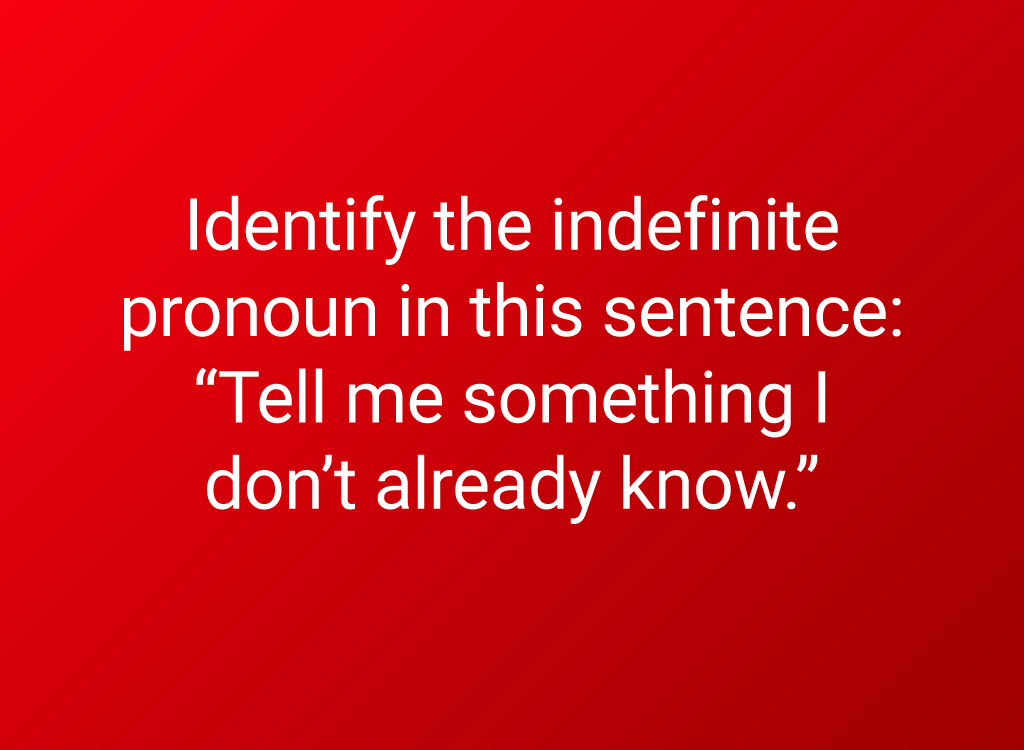
An indefinite pronoun doesn’t refer to any particular person, thing, or amount.
Answer: “something”
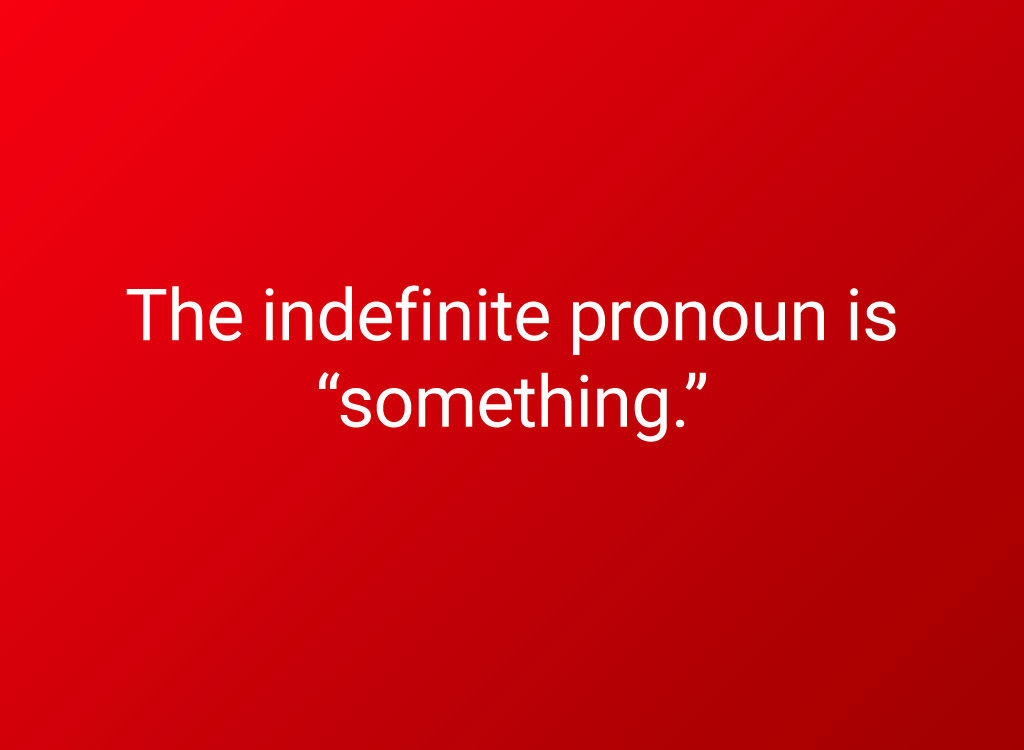
Here are some other common indefinite pronouns: nobody, nothing, everyone, everybody, everything, somebody, and someone.
Question: Put quotation marks where needed.
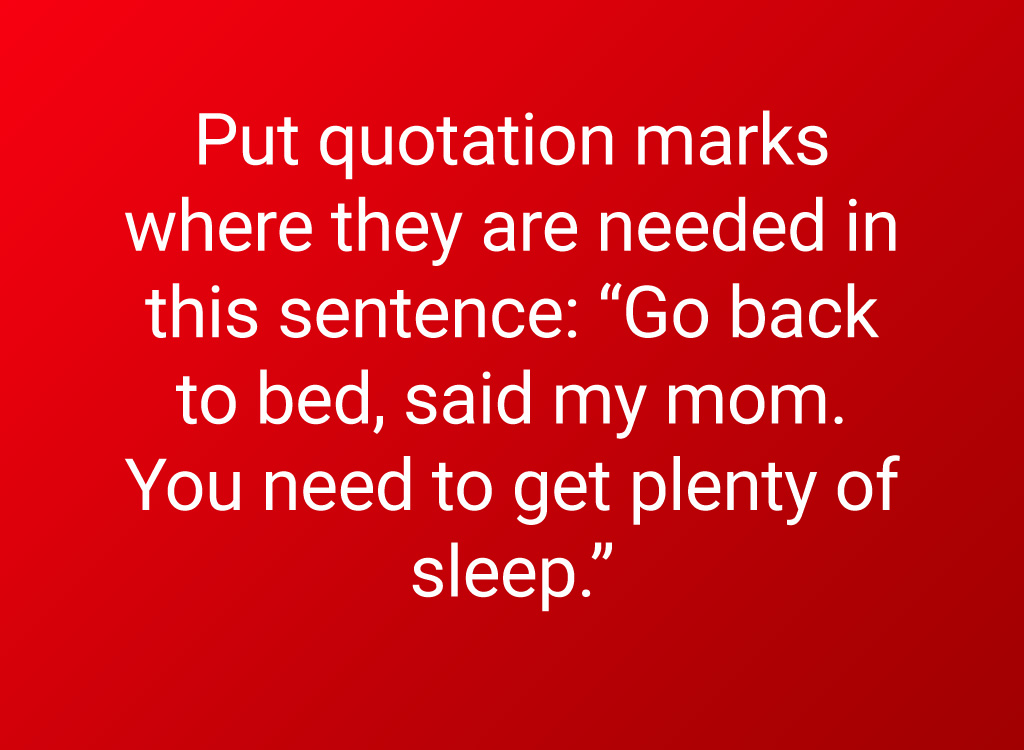
Quotation marks can be used to show that a word or phrase is dialogue (direct speech), the title of a poem or song, or meant to be ironic.
Answer: You’ll need two sets of quotations marks.
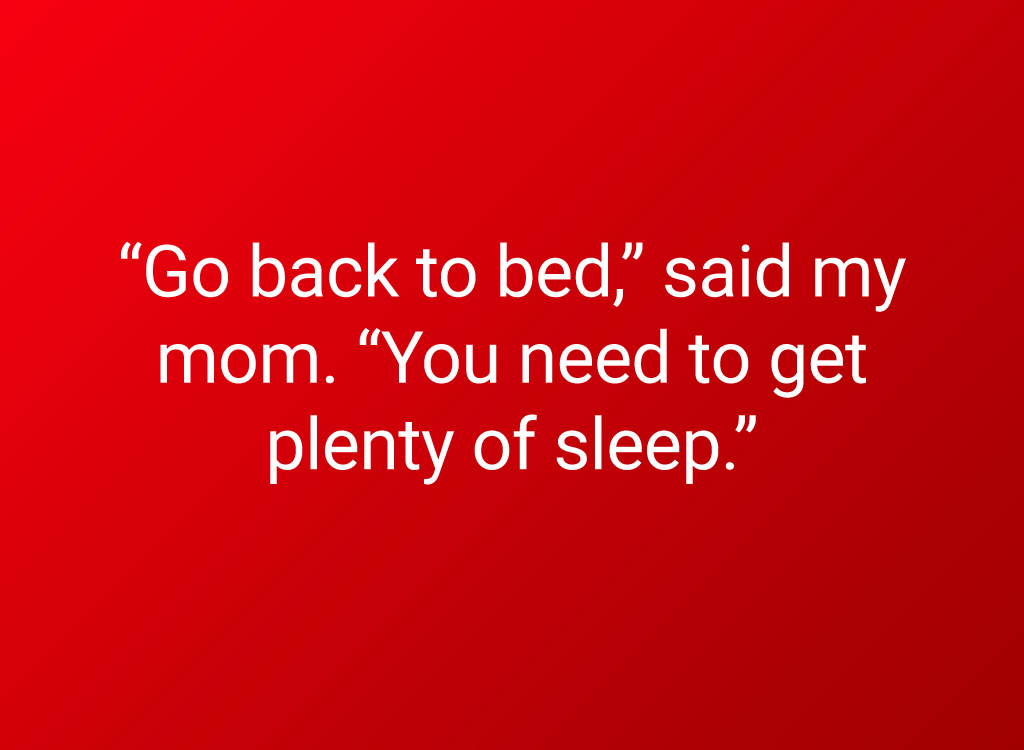
Notice that the comma and the period go inside the quotation marks.
Question: Find the object complement.
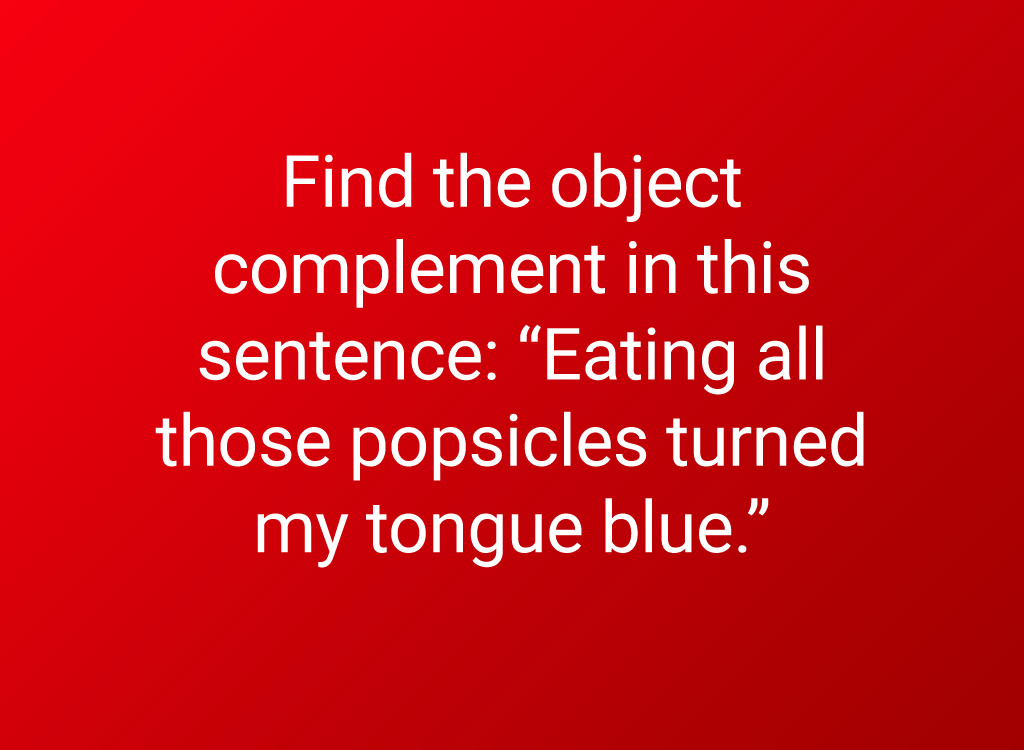
An object complement comes after the direct object and modifies or renames it.
Answer: “blue”
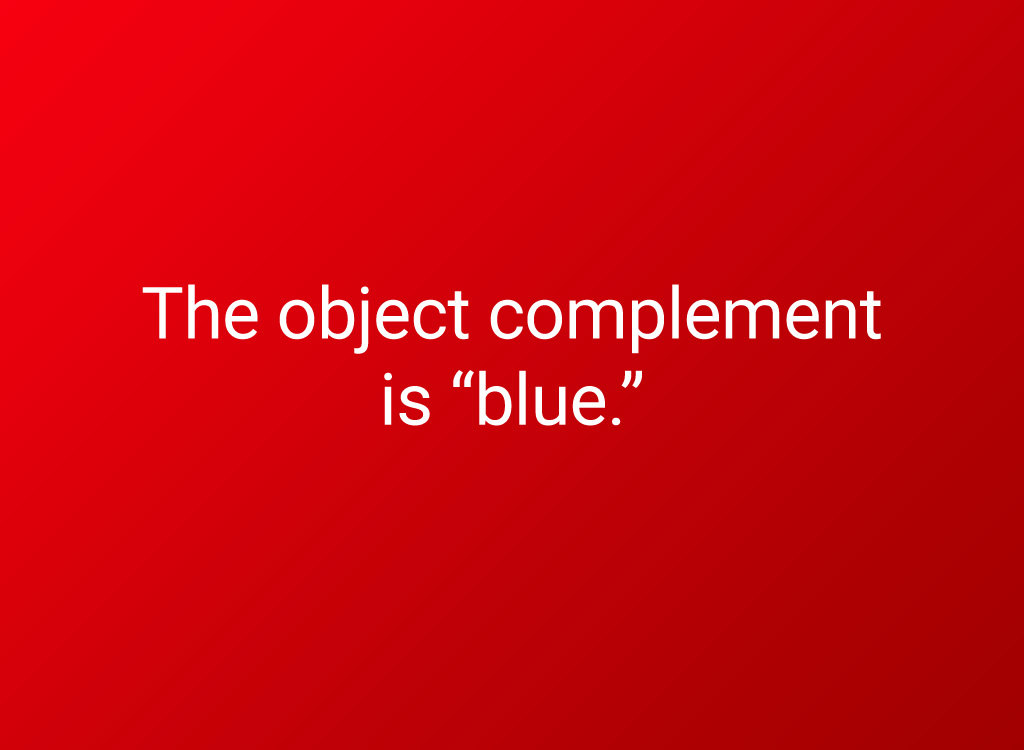
First identify the direct object—in this case, it’s “tongue” because that’s what receives the action of the verb “turned.” Right after that is “blue,” an object complement that describes the tongue.
Question: Find the example of onomatopoeia.
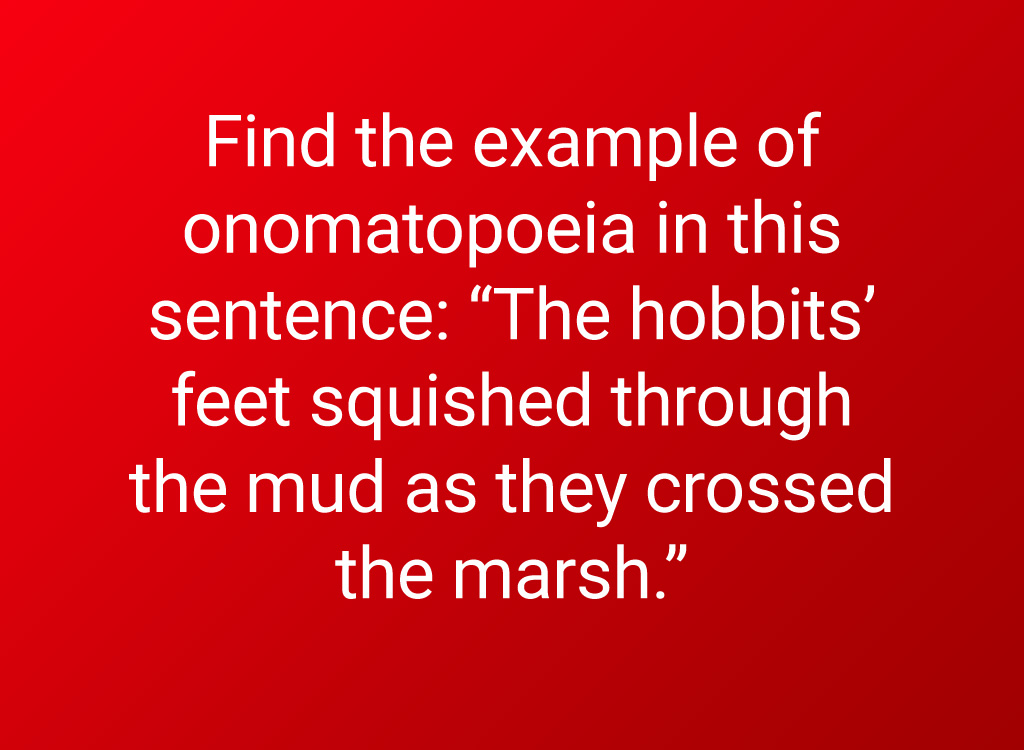
Onomatopoeia is a word formed by the sound something makes.
Answer: “squished”
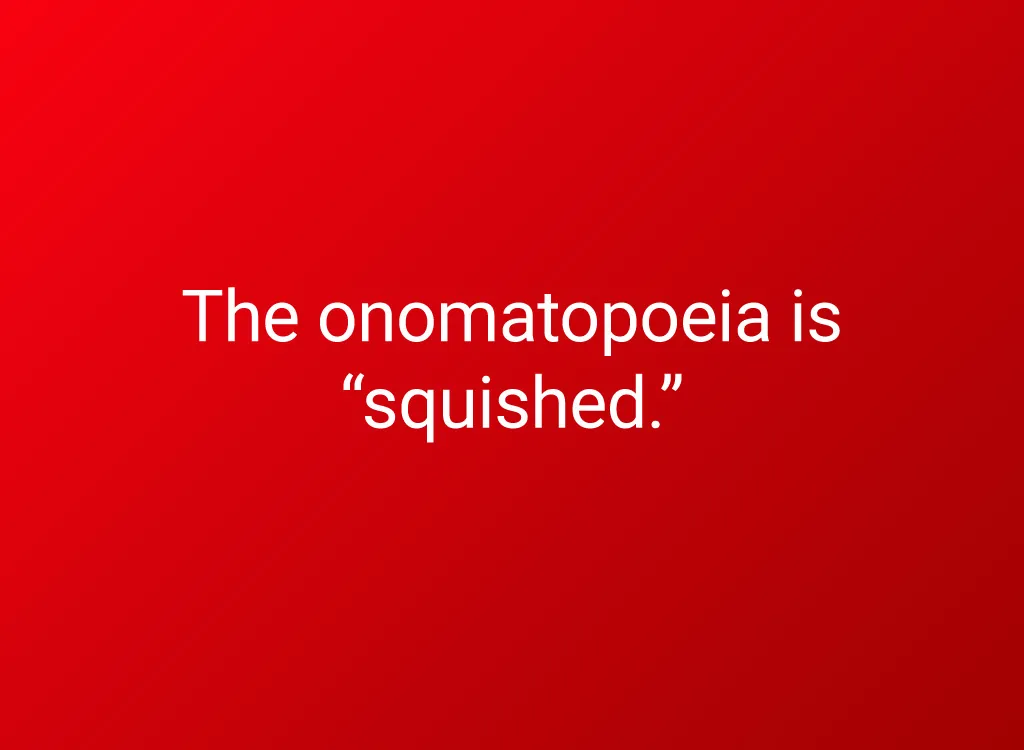
If you were to write down the sound a foot makes going into mud, it would sound a lot like “squish.” And for more ways to test your brilliance, don’t miss the time when Our Correspondent Took the NFL’s Cognitive Exam (and Here’s What They Learned).
To discover more amazing secrets about living your best life, click here to sign up for our FREE daily newsletter!